
Dynamics

|
Generational Dynamics |
| Forecasting America's Destiny ... and the World's | |
| HOME WEB LOG COUNTRY WIKI COMMENT FORUM DOWNLOADS ABOUT | |
Hizbollah becomes 'most hated organization in the Arab world'
This morning's key headlines from GenerationalDynamics.com.
 |
Admiral Robert Willard, head of U.S. Pacific Command, told the Senate Armed Services Committee that China is continuing its military building buildup "unabated," and independent of anything that the U.S. does. "They continue to advance their capabilities and capacities in all areas," he said, including in the maritime, cyber and space domains. As I wrote several months ago in "New Pentagon report outlines China's military buildup," China's plans for total war with the United States appear to be coming to fruition, and an attack within 12-18 months is a reasonable expectation. China will be unveiling its 2012 military budget in the next few weeks, and this will provide a more detailed update. Reuters
Venezuela's Vice President Elias Jaua announced on Tuesday that President Hugo Chávez was in good condition after undergoing a fresh round of surgery to remove a lesion that he feared might be malignant. Miami Herald
France's top court, the Constitutional Council, ruled Tuesday that a crazy law backed by President Nicolas Sarkozy that requires a one-year jail term for anyone who denies that Turkey committed genocide of Armenians in 1915. Passage of the law in December created a great deal of tension between France and Turkey, and between Sarkozy and Turkey's Prime Minister Recep Tayyip Erdogan, who denounced the law as "tantamount to discrimination and racism." Turkey's deputy prime minister Bulent Arinc the court ruling "has averted a potentially serious crisis in Turkish-French ties," accusing Sarkozy of pandering to an estimated 400,000 voters of Armenian origin ahead of an April-May presidential election. The court labelled the law an "unconstitutional attack on freedom of expression" and it said it wished "not to enter into the realm of responsibility that belongs to historians." Sarkozy swiftly vowed to draft a new version of the law, taking the court's objections into account. Agence France Presse (AFP)
Al-Qaeda linked terror group Jundallah ("Soldiers of God") has claimed responsiblity for an attack on a bus in northwest Pakistan, killing 18 people. The terrorists opened fire on the bus, forced the passengers to leave the bus, asked for identification, and killed those whose names indicated they were Shia. This is the latest in a recent series of attacks on Sufi and Shia Muslims by Sunni terrorist groups, particularly Tehreek-e-Taliban Pakistan (TTP), the Pakistan Taliban. Jundallah has conducted some major terrorist attacks in Iran, including a major 2009 attack on the Revolutionary Guards. (See "Furious Iran blames Pakistan, US and Britain for Sunday's terrorist attacks".) Most of the victims in Tuesday's attack were returning from holy Shia shrines in Iran. Express Tribune (Pakistan)
Jundallah is linked to the Islamic Movement of Uzbekistan (IMU), a group that seeks to achieve the glorious international status of the Yemen-based al-Qaeda on the Arabian Peninsula (AQAP), which is widely regarded as the most dangerous international terrorist group today. One of the IMU's German operatives, Munir Chouka, also known as Abu Adam Al-Almani, who released a recent video:
"Abu Adam begins by introducing his audience to the main theme of his message, namely that Germany is an ally of the U.S. and an enemy state.Abu Adam discusses at length Germany's role in and commemoration of the Holocaust. Remembering a trip he took with his workplace to several memorial sites for Jews, noting that Germany is full of such sites, he recalls being told that less than 1% of Germans actively opposed Hitler's plans to exterminate the Jews. After Hitler's regime fell, he says, most Germans were awestruck and regretted the Holocaust, and even today, tax money goes to the Jews, not to mention toward erecting the Jewish memorials scattered throughout the country. He notes German human rights laws passed after the war, which he attributes to German guilt and pangs of conscience over the Holocaust, and which he says were hypocritical, as the Germans are actually a discriminatory people. Thus, they came to regret these laws once Islam began spreading among them."
Abu Adam points out that Germany is an ally of the U.S. and an enemy state. Memri
 |
The bloody extermination attacks on innocent Arab civilians by the regime of Syria's president Bashar al-Assad has already deeply affected one terror group, Hamas, and is now threatening Hizbollah and its General Secretary Hassan Nasrallah as well. Hamas, a Sunni organization, has virtually ended its close relationship with Iran, because of Iran's alliance with and support of al-Assad. But Hizbollah, a Shia organization, has retained its loyalty to al-Assad and to Iran, even though Iran's own sanctions-based financial troubles are forcing it to sharply cut its funding to Hizbollah. Hizbollah is a "two-headed" organization, one head allied with Iran, and the other head a domestic political party in Lebanon. As its alliance with Iran founders, it is also being harshly criticized by Sunni Arabs throughout the region for its support for al-Assad. Ynet
They're popping champagne corks again on Wall Street, as the Dow Industrials closed at 13005 for the first time since 2007. In fact, it feels exactly like the party atmosphere of 2007, as I expressed my frequent astonishment that Wall Street could be so oblivious to the huge stock market bubble that was being created. And I must admit that I'm astonished again at how they've learned no lessons from that experience, or the Nasdaq crash of 2000. As I described in "11-Feb-12 News -- Price/earnings ratio (valuations) trending toward collapse," stock valuations have been above historical averages since 1995, and by the Law of Mean Reversion, the Dow will be falling to the 3000 level or lower. This is absolutely certain. I strongly urge all readers of this to do everything possible to protect your assets.
(Comments: For reader comments, questions and discussion,
see the 29-Feb-12 World View -- China's military buildup continues 'unabated'
thread of the Generational Dynamics forum. Comments may be
posted anonymously.)
(29-Feb-2012)
Permanent Link
Receive daily World View columns by e-mail
Donate to Generational Dynamics via PayPal
China calls Hillary Clinton 'super arrogant' over Syria remarks
This morning's key headlines from GenerationalDynamics.com.
 |
Germany's Bundestag on Monday approved the new bailout package for Greece by a large margin -- 496 to 90, with five abstentions. But politicians warned German Chancellor Angela Merkel that they would be opposed to any more support for Greece. Standard & Poor's lowered the debt rating of the European Financial Stability Facility (EFSF), whose purpose is to borrow money from countries like China or Brazil and use the money to bailout other European countries. A lower rating means that it will have reduced chances of borrowing money (assuming that it ever had any chance). Telegraph
Greece's credit rating was cut to 'selective default' on Monday by Standard & Poor's, because of the implementation of collective action clauses (CACs) on its debt. The bailout package depends on private investors "voluntarily" giving up 75% of their original investment. The CACs are retroactive laws passed on Friday by Greece's parliament to force any holdouts to accept the 75% haircut anyway. According to S&P,
"In our opinion, Greece’s retroactive insertion of CACs materially changes the original terms of the affected debt and constitutes the launch of what we consider to be a distressed debt restructuring,” read S&P’s post-market release."
S&P says that if all works out will and the participation rate is high in the "voluntary" program, then Greece would receive an upgrade back to CCC. But woe unto Greece if the participation rate is low -- because that would lead to outright default. The deadline is March 12. Forbes
Chancellor Angela Merkel made clear on Monday that she disagrees with Interior Minister Hans-Peter Friedrich, who called for Greece to quit the euro zone. Her rebuke caused Friedrich to distance himself from his own politically incorrect statements: "I have no doubts about the chancellor's bailout course." Spiegel
According to conservative German politician Jan Fleischhauer:
"The German parliament is set to approve a new multibillion euro bailout package for Greece on Monday, but instead of thanks, southern Europeans are expressing their dislike of us. Germans will have to get used to their new role: We have become the Americans of Europe. ...Sentiment towards the Germans isn't very good in the region right now. Hardly a day goes by without Chancellor Angela Merkel being depicted in a Nazi uniform somewhere. Swastikas are a common sight as well. It doesn't seem to help at all that we faithfully approve one aid package after the other. If calculations by experts are true, then we are far beyond the point where we are just providing loan guarantees.
A good deal of the €130 billion expected to be approved by the German parliament on Monday will never be seen again. But if you read the editorial pages of newspapers in the crisis regions, for whom this money is intended, you would be led to believe that we are out to achieve what our grandfathers failed to do 70 years ago (and this despite the fact that research into Hitler outside of Greece is fairly unanimous in the belief that National Socialism didn't launch its tyranny of Europe with a bailout package). ...
The Americans also had every reason to expect a little more gratitude -- after all, it was their soldiers who had to intervene when a dictator somewhere lived out his bloody fantasies while the international community stood by wringing its hands. People came to secretly rely on the USA as a global cop in the same way that Germany's neighbors are now expecting the Germans to save the euro."
Reports that Russia's secret services have foiled a plan by Chechen separatists to murder Vladimir Putin have raised suspicions of a PR stunt. The report comes just six days before a presidential election, just as Putin needed something to distract the public from the recent large anti-Putin street protests. According to one analyst, "Although nothing can be ruled out nowadays, it's perfectly clear that this thwarted plot comes at a crucial time in Putin's election campaign. Before this news was announced, many analysts said his campaign must receive new impetus in order to show how important Putin is for the country and how much Russia's enemies hate him." A similar assassination attempt was allegedly foiled on the day of Russia's last presidential election in March 2008. RFERL
 |
At least 65 more people were killed on Monday by the security forces of the regime of Syria's president Bashar al-Assad. Worst hit was the city of Homs, where security forces shelled residential neighborhoods and fired live ammunition at protesters. Perhaps the reason that al-Assad is grinning in the adjoining picture is that the opposition Syrian National Council (SNC) has splintered, with several members forming a rival organization. Al-Bawaba
Last week, Secretary of State Hillary Clinton called the U.N. Security Council vetoes by Russia and China "despicable" acts, in view of the massive slaughter of civilians by the regime of Syria's president Bashar al-Assad. On Monday,, China's Foreign Ministry struck back, saying that Clinton was "super arrogant" to claim to speak for the Arab people. "This is totally unacceptable for us. China has always determined its stance on the Syrian issue proceeding from the peace and stability of Syria and the Middle East, and from protecting the long-term, fundamental interests of the Syrian and Arab peoples." Shanghai Daily
(Comments: For reader comments, questions and discussion,
see the 28-Feb-12 World View -- Germany may be replacing America as the new international villain
thread of the Generational Dynamics forum. Comments may be
posted anonymously.)
(28-Feb-2012)
Permanent Link
Receive daily World View columns by e-mail
Donate to Generational Dynamics via PayPal
Why gasoline prices are increasing
This morning's key headlines from GenerationalDynamics.com.
 |
The widespread anti-American violence triggered by the recent burning of copies of the Koran is showing no signs of abating. Seven U.S. military trainers were wounded on Sunday when a grenade was thrown at their base in northern Afghanistan. Ryan Crocker, the U.S. ambassador to Afghanistan, resisted suggestions that Americans should pullout of Afghanistan:
"Tensions are running very high here. I think we need to let things calm down, return to a more normal atmosphere, and then get on with business.This is not the time to decide that we are done here. We have got to redouble our efforts. We've got to create a situation that al Qaeda is not coming back."
A suicide car bomber on Sunday drove his car into the Church of Christ in Jos, a major city in central Nigeria, killing at least three people. The Islamist terrorist group Boko Haram claimed credit for the bombing. The bombing immediately triggered a violent response as Christian youths set up street blockades and attacked and killed two Muslims on motocycles. BBC
Germany's interior minister Hans-Peter Friedrich has come out strongly in favor of having Greece leave the eurozone, and return to the drachma currency:
"I'm not saying that Greece should be kicked out, but rather to create incentives that it can’t say 'no' to. Outside European monetary union Greece's chances of regenerating itself and become competitive are definitely bigger than if it remained inside the eurozone."
German Chancellor Angela Merkel is opposed to Greece leaving the eurozone, so this represents a major split in her government, at a time when elections are approaching. In fact, I believe that this is the first time a political at that level anywhere in Europe has called for Greece to leave the eurozone. Telegraph
Interview on CNN on Sunday with John Hofmeister, Former Ceo, Shell Oil, Citizens For Affordable Energy
JOHN HOFMEISTER, FORMER CEO, SHELL OIL, CITIZENS FOR AFFORDABLE ENERGY: Well, my concern is that the crude oil price could hit $120, $130 a gallon. It's $109 today. That's up about $10 just in the last two weeks. And it's going to get worse, Candy, because what has changed dramatically from before, and nobody talks about it -- are the actual statistics of China's demand. Ten years ago, 4 million barrels a day. Last year, 9 million barrels a day. By 2015, 15 million barrels a day.They have played their ace on us. What they have done, they have granted loans, $120 billion in loans, in the last three years alone, to state-owned oil companies so they get first oil. That oil is not going to come on the global trading market.
Our demand is down 6 percent year-over-year, and prices are skyrocketing. It's going to stay that way, and it could get worse in 2014, 2015 as well. ...
People should not underestimate that right behind China is India. India is going for 4 million barrels a day to 7 million barrels a day demand. That's 10 million barrels a day, and the world seems stuck at about 88 million barrels, when we need to be getting to 96 or 98 million barrels. That's the big problem. It's a game of math.
And even if we're using less and paying more or headed for gas lines, that's not good for the economy. I worry about the future of the economy under this high price scenario. ...
In the more expensive states like California, New York, and some other places, it could get beyond $5 a gallon. I don't know if the national average would get to $5, but it could, because in addition to the crude oil price, there are three refineries closing on the East Coast.
That's going to put the middle Atlantic states and New England in even greater jeopardy of having to bring in high cost imports from elsewhere, because these refineries are closing, because they can't make money."
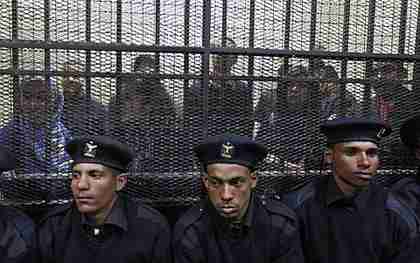 |
A court in Egypt on Sunday opened the trial of 43 people, including 16 Americans, employees of non-profit pro-democracy groups, charged with illegal political activities and operating without licenses. The charges have angered American politicians, who have threatened to cut off America's $1.3 billion in military aid to Egypt, especially because one of the Americans is Sam LaHood, the son of US Transportation Secretary Ray LaHood. No Americans were in court on Sunday, some having left the country, and others hiding out in the American Embassy. The judge adjourned the trial until April 26. VOA
(Comments: For reader comments, questions and discussion,
see the 27-Feb-12 World View -- German cabinet minister calls for Greece to exit euro currency
thread of the Generational Dynamics forum. Comments may be
posted anonymously.)
(27-Feb-2012)
Permanent Link
Receive daily World View columns by e-mail
Donate to Generational Dynamics via PayPal
Chavez's cancer surgery worries his leftist club of nations
This morning's key headlines from GenerationalDynamics.com.
 |
Question: What do Cuba, Nicaragua, Bolivia, Dominican Republic and Syria have in common? Answer: They're all ideological beneficiaries of Venezuela's leftist president Hugo Chávez, and they're all worried about Chávez's health, now that he's in Cuba undergoing emergency surgery for a malignant cancer tumor. If Chávez dies, hardest hit will be Cuba, which depends on Venezuela for two-thirds of its oil, and $5 billion a year for services such as doctors and sports trainers. It would be "catastrophic" for Cuba if it were forced to pay market prices for oil, because Cuba imports 70% of its food, and would have to start rationing. That's what happened during the "Special Period" two decades ago, when Cuba lost its previous patron, the Soviet Union. AP
North Korea vowed Saturday to launch a "sacred war" against South Korea and the United States, accusing the allies of declaring war through their joint military exercises. "Key Resolve" is scheduled for February 27 to March 9, with about 200,000 South Korean and 2,100 U.S. troops participating. Separately, "Foal Eagle' will be held from March 9 to April 30. The purpose of these military exercises is to bolster their readiness against a possible North Korean invasion. However, the North Korean denounce them as being practice for an invasion of the North:
"Key Resolve and Foal Eagle are unpardonable war hysteria kicked up by the hooligans to desecrate our mourning period and an unpardonable infringement upon our sovereignty and dignity.Now that a war has been declared against us, the army and people are firmly determined to counter it with a sacred war of our own style and protect the security of the nation and the peace of the country.
The sacred war will make a clean sweep of the Lee group and those warmongers from this land by the war mode of our own style, our strong striking means unknown to the world."
The last sentence refers to South Korean president Lee Myung-bak. Yonhap (Seoul)
Germany intends to send to Greece tax officers who would volunteer to assist with tax collection. According to Germany's Finance Ministry, "the [German] federal government wants to lend a helping hand. More than 160 volunteers of the German financial authorities are ready. Volunteers must have good knowledge of English, while there are several who speak Greek, too." Kathimerini
 |
The Taliban are claiming credit for the murder of two U.S. military officers in Afghanistan's Interior Ministry in Kabul on Saturday, a place that was supposed to be guaranteed secure. Nato has responded by ordering all its officers and advisers to leave Afghan government ministries immediately. In the meantime, violent demonstrations have continued to worsen across Afghanistan, having been triggered by the recent Koran-burning incident at Bagram Air Base. At least 27 people have died in violent circumstances, including two other Nato service members whose killing was claimed by the Taliban. VOA
Pakistan's security forces on Saturday demolished the Abbottabad compound where Osama bin Laden was killed in a covert US raid in May. The raid was a major humiliation to Pakistan's armed forces, since the compound was located only a mile away from the Pakistan Military Academy. Officials haven't said why the building is being destroyed at this time, but they've expressed fear that the compound might become a shrine or tourist attraction. AFP
(Comments: For reader comments, questions and discussion,
see the 26-Feb-12 World View -- North Korea threatens 'sacred war' against South Korea and U.S.
thread of the Generational Dynamics forum. Comments may be
posted anonymously.)
(26-Feb-2012)
Permanent Link
Receive daily World View columns by e-mail
Donate to Generational Dynamics via PayPal
Greece launches 'voluntary' bond swap deal for private investors
This morning's key headlines from GenerationalDynamics.com.
 |
U.S. Secretary of State Hillary Rodham Clinton blasted Russia and China at a Friday press conference for blocking any attempt in the U.N. Security Council to criticize the violence by Syria's president Bashar al-Assad against his own people:
"It's quite distressing to see two permanent members of the Security Council using their veto while people are being murdered — women, children, brave young men — houses are being destroyed. It is just despicable and I ask whose side are they on? They are clearly not on the side of the Syrian people."
Russia and China have expressed the concern that any Security Council criticism of the violence in Syria would lead to military action by the Arabs, Turkey and the West, and that any such military action could trigger a wider war in the region. CBS News
Dozens of nations attended the "Friends of Syria" conference in Tunisia on Friday, convened to discuss what to do about the escalating bloody, murderous violence by the regime of Syria's president Bashar al-Assad against his own people. Noticeably absent were Assad's allies, Russia and China. However, the "all talk, no action" nature of the conference caused the delegation from Saudi Arabia, led by Foreign Minister Prince Saud al-Faisal, to walk out of the conference, saying that Assad had lost the authority to govern.
"There is no other means but transferring power either voluntarily or by force. Is it justice to offer aid and leave the Syrians to the killing machine? My country will not take part in an action that will not lead to the quick protection of the Syrians."
When asked about providing arms to the Syrian opposition, he said, "I think it's an excellent idea." Several delegates called for Arab League military intervention. Qatar's Foreign Minister Sheikh Hamad bin Jassim al-Thani said:
"We want this meeting to be a start to stopping the violence in Syria and this cannot be done except after the formation of an international Arab force to maintain security, the opening of secure humanitarian corridors to bring aid to the Syrian people and the application of Arab League decisions."
Clasping the hand of his youngest daughter, Venezuela's president Hugo Chávez bid an emotional farewell to his political allies and troops standing at attention at the Miraflores presidential palace:
"I say this from my gut: With cancer or without cancer ... come rain, thunder or lightning ... nobody can avoid a great patriotic victory Oct. 7 [the date of the presidential election].Long live Chávez!
Our (founding) father Simon Bolivar once said, 'I am a man of troubles.' I say as a son of Bolivar, I too am a man of troubles. We are a people of troubles. Let the troubles come and add like the cross of Christ to the definitive liberation of the country. With the cross of Christ, one must sometimes bear pain as a spur to love. It is fuel for love."
He departed Venezuela on Friday for Cuba for urgent surgery to remove a tumor he says is probably malignant. AP
 |
Greece's parliament has approved the "collective action clause" (CAC), which retroactively changes the terms of Greek bonds issued in the past. On Friday, Greece announced the launch of the program to track down private investors in Greek bonds and convince them to "voluntarily" lose about 75% of their investment by exchanging their bonds for shiny new bonds worth 75% less. Since most of the private investors are national banks, including Greek banks, it's expected that there will be a great deal of "voluntary" participation in the exchange. For those who don't want to participate, the CAC will force them to participate. Greek officials have been saying that they expect 90% participation in the voluntary program, and I have no idea whether that's just bullshit or they really believe it. We should know soon, because the bond exchange program must be completed by March 12. Financial Times (Access) and Kathimerini
Outrage is growing over the news that Greece's MPs (members of Parliament) have transferred €2 billion euros abroad during the last two years, since Greece's financial crisis began. Finance Minister Evangelos Venizelos told Parliament that he's acquired information relating to bank transfers for the last year. "The list includes politicians, and relatives of politicians, with transfers in excess of 100,000 euros." Venizelos noted however that the list of names would not be made public as the individuals will be summoned to provide explanations. "Some of the cases might involve health problems or relatives making legal and normal commercial exchanges." Kathimerini
 |
Possibly the best bratwurst in the world is Nuremberg bratwurst, made from sheep's intestines, stuffed with minced pork meat, spiced with marjoram. Yum. Over the centuries those sheep's intestines have come from Iran to local butchers. "There are other countries of origin," including Turkey and New Zealand, according to a master butcher. "But traditionally the best sheep's intestines come from Iran." But Iran's sheep intestine costs have skyrocketed, tripling the cost of producing the bratwurst. The price increases are blamed on instability in Iran, fewer sheep being slaughtered in the country, and more competition from places like China, which is stepping up its sausage production. Spiegel
(Comments: For reader comments, questions and discussion,
see the 25-Feb-12 World View -- Saudis walk out of Syria conference, demanding military response
thread of the Generational Dynamics forum. Comments may be
posted anonymously.)
(25-Feb-2012)
Permanent Link
Receive daily World View columns by e-mail
Donate to Generational Dynamics via PayPal
For Boomers, 'Work til you drop' is literally true
This morning's key headlines from GenerationalDynamics.com.
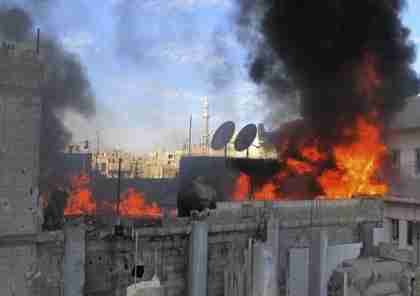 |
With the horrific slaughter by the regime of Syria's president Bashar al-Assad continuing without end and even worsening, and with attempts to condemn the violence in the United Nations Security Council thwarted by Russian and Chinese vetoes, Western and Arab "Friends of Syria" will be meeting in Tunis, Tunisia, on Friday to address the problem. The group is expected to demand Damascus to permit foreign humanitarian aid, but it's not known if the group will go further by proposing military intervention. VOA
In a poll conducted just before the recent bailout of Greece, Greeks were asked to identify their main feelings on Germany. 41% respondents named anger, indignation or fury, 30% ranged from disappointment and fear to revulsion, while positive sentiments were just 8.6%. Greeks have never been this hostile to Germans in the postwar period, even after the brutal Nazi occupation of Greece during the war. Some 32% of poll respondents listed the first words they associated with Germany as "Hitler, Nazism or the Third Reich." More than 90% agreed that Greece should claim "by any means" war reparations from Germany, and 81% agreed that Germany is attempting to dominate Europe through its financial power. AP
 |
Well, if the "Friends of Syria" conference is Friday, then the Somalia conference was Thursday, in London, with delegates from over 40 countries. Somalia is a failed state that has been largely overrun by the Islamist terror group al-Shabaab. Somali is also the principal source of the piracy problem in the Indian Ocean. There have been many international conferences on Somalia, so one would not expect this new conference to be a "turning point," but that's what British prime minister David Cameron said:
"Unless we can help the people of Somalia to build a stable future, the problems will keep reoccurring.For two decades politicians in the west have too often dismissed the problems in Somalia as simply too difficult and too remote to deal with. Engagement has been sporadic and half-hearted.
That fatalism has failed Somalia. And it has failed the international community too. Today we have an unprecedented opportunity to change that. There is a real momentum right now."
There has been military intervention in Somalia by the African Union, Ethiopia and Kenya in the last few years, without much changing, and since Cameron didn't propose anything new, it's hard to see how this "turning point" will make any difference. BBC and Guardian
China's decision to return 31 captured defectors to North Korea has unleashed a chorus of protest Thursday in South Korea and the U.S. Many North Koreans travel through China and hide underground for months or years until missionaries can spirit them to another Asian country, from which they can travel to South Korea. The stakes for defectors were raised significantly in recent months after new North Korean leader Kim Jong-un –- successor to his father, Kim Jong-il, who died in December –- announced that all defectors faced having three generations of their families imprisoned, tortured or killed. This happens as the United States and North Korea hold their first talks since Kim Jong-il's death. LA Times
Many Boomers had worked hard throughout their lives, hoping to retire at age 65 with money saved in their 401(k)'s, augmented by pensions, social security and Medicare. But now, Boomers are unable to retire because their 401(k) nest eggs have been diminished by market crashes, many companies are eliminating defined benefit pensions, and Medicare is close to bankruptcy. As a result, Boomers have become the generation that never stops working, even though age discrimination has become the norm. According to one expert, "My advice [to Boomers] is above all don't retire. If you like your job at all, hold onto it. Because getting back in in this era is essentially impossible." AP
(Comments: For reader comments, questions and discussion,
see the 24-Feb-12 World View -- The 'Friends of Syria' conference to bypass U.N. Security Council
thread of the Generational Dynamics forum. Comments may be
posted anonymously.)
(24-Feb-2012)
Permanent Link
Receive daily World View columns by e-mail
Donate to Generational Dynamics via PayPal
International pressure grows as journalists are killed in Syria
This morning's key headlines from GenerationalDynamics.com.
 |
Anti-American protests have spread across the eastern provinces of Afghanistan, even though the United States has quickly apologized for burning copies of the Koran and other religious materials that had been pulled from shelves of the Parwan Detention Facility, adjoining Bagram Air Field, because they were apparently used by prisoners to pass extremist messages to one another. In Kabul, thousands of protesters chanted "Death to America," and hurled rocks and set tires alight outside a complex that is home to foreign contractors, police and some coalition military forces. CBS News
Fitch Ratings service has analyzed the Eurogroup bailout statement, " including 'private sector involvement' (PSI) and a subsequent announcement from the Greek authorities outlining the terms of the proposed exchange of Greek Government Bonds (GGBs)." The subsequent statement "confirms the Greek government's intention to introduce collective action clauses (CACs) into those GGBs governed by Greek law."
"In Fitch's opinion, the exchange, if completed, would constitute a 'distressed debt exchange' (DDE) in line with its criteria and consequently yesterday's announcements set in motion the agency's process for reviewing Greece's issuer and debt securities ratings. The sovereign [Issuer Default Rating] (IDR) has accordingly been lowered to 'C' from 'CCC' indicating that default is highly likely in the near term. ...Fitch considers that the proposal to reduce Greece's public debt burden via a debt exchange with private creditors will, if completed, constitute a rating default, and result in the country's IDR being lowered to 'Restricted Default' ('RD') upon completion. ...
Fitch regards the imposition of retrospective CACs as a material adverse change in the terms and conditions of GGBs in the context of an imminent debt exchange and confirms its assessment that the exchange will be distressed and de facto coercive on private holders of Greek bonds."
Anders Borg, Sweden's finance minister, says:
"Of course the Greeks remain stuck in their tragedy; this is a new act in a long drama. I don't think we should consider that they are cleared of any problems, but I do think we've reduced the Greek problem to just a Greek problem."
Poland's former deputy finance minister Gregorz Kolodko said:
"After the latest meeting of eurozone finance ministers, resulting in the decision to grant Greece a second €130bn bail-out, one might keep saying that things are on the right track. But they are not. They are heading for a catastrophe that is already unfolding, albeit in slow motion. Cheating the public and miscalculating and misleading the market is neither a strategy, nor a policy. It is sheer stupidity."
Vassilis Korkidis, head of the Greek Commerce Confederation, said:
"We sowed the wind, now we reap the whirlwind... The new bailout is selling us time and hope at a very high price, while it doggedly continues to impose harsh austerity measures that keep us in a long and deep recession."
What has become clear to many analysts is that the bailout agreement is a cynical exercise that nobody believes in. Its purpose is not to save Greece, but to save the rest of Europe from Greece. EuroIntelligence
Art Cashin, a UBS trader who is considered by many to be the wisest of the wise men on the floor of the NY Stock Exchange, said last week that an incorrectly done bailout of Greece that triggered the payment of credit default swaps (CDSs) could send us back to the "Middle Ages," because the CDS market was so opaque. Then, on Monday, he retracted his comments after many people pointed out to him that the CDS market was not quite as opaque as he thought. Then, on Wednesday, he flip-flopped again, after comments from readers indicate that many financial crisis risks still remain, and that much of the CDS market really is opaque. I think it's pretty safe to say that nobody knows for sure what a Greek default will mean. The only purpose of the bailout was to prevent the Greek crisis from spreading to Portugal and other European countries, and now that purpose will be tested. Business Insider
 |
Some 10,000 mortar shells have landed in the small Baba Amr neighborhood of Homs, Syria, in the last few days, killing and wounding perhaps thousands of innocent civilians. But international outrage has particularly increased because a shell killed two well-respected journalists who had sneaked into Baba Amr and were reporting on the daily massacre -- Marie Colvin of the Sunday Times, and Remi Ochlik, an award-winning French photographer. In one of her last reports, Colvin said,
"I watched a little baby die today, absolutely horrific, a two year old - found the shrapnel had gone into the left chest and the doctor said: 'I can't do anything,' and his little tummy just kept heaving until he died. That is happening over and over and over. There are 28,000 people in Baba Amr. The Syrians will not let them out and are shelling all the civilian areas. We live in fear of a massacre."
It is suspected, but not proven, that the Bashar al-Assad regime had determined her location and targeted her and other reporters. BBC
Most world media portray the Syrian regime as increasingly isolated in the international community, with little to hope for but continued support from Russia (which in turn, that narrative goes, is driven exclusively by commercial interests). However, Syrian officials foresee a loose confederation consisting of Syria, Iran and Iraq. They see Turkey, Qatar and Israel among the main instigators of international pressure on Syria, along with the United States standing behind them, with the main purpose being to counter Iran's influence. Syria has been surprised by the military defections to the opposition, and the length of time that the demonstrations have continued. Their only regret is that they didn't take all the necessary measures to neutralize the opposition more quickly. Ria Novosti (Moscow)
 |
Israeli officials are praising Thai authorities for conducting a thorough investigation into three recent explosions in Bangkok, and determining that they were targeting Israeli diplomats. Thailand has asked Malaysia to hand over Masoud Sedaghatzadeh, an Iranian man suspected of being part of a terror cell involved in the explosions. Another suspect, Saeid Moradi, has been hospitalized after losing both his legs in the botched terrorist attack. The Nation (Thailand)
(Comments: For reader comments, questions and discussion,
see the 23-Feb-12 World View -- Backlash builds on Greece bailout as default looms
thread of the Generational Dynamics forum. Comments may be
posted anonymously.)
(23-Feb-2012)
Permanent Link
Receive daily World View columns by e-mail
Donate to Generational Dynamics via PayPal
Tibetan's Lhakar movement confounds China's Han leaders
This morning's key headlines from GenerationalDynamics.com.
 |
U.S. President Barack Obama will host a meeting with Prime Minister Benjamin Netanyahu in Washington on March 5. The meeting will likely center on the question of Iran, and the widely discussed proposal for somebody (Israel or the U.S.) to bomb Iran's nuclear installations to prevent development of a nuclear weapon. When the two met at the White House last year on May 20, they disagreed sharply on the question of Israel returning to its pre-1967 boundaries. It's believed that Israel and the U.S. are in disagreement on the Iran issue as well. Haaretz
The army of Syria's president Bashar al-Assad launched an intensive assault on residences of the Baba Amr neighborhood of Homs. Watching the barrage of shells injure civilians, and a baby die after shrapnel had pierced his body, one reporter called the assault "sickening." Hundreds of shells rained down on the city in a two-hour period, reportedly razing buildings and killing at least 30 people. It's suspected that the assault is a prelude to a full scale ground attack. BBC
 |
Venezuela's president Hugo Chávez took a secret trip to Cuba over the weekend to test for a return of the cancerous tumor that was removed last summer. "It’s a small lesion that must be removed surgically. I’m in good physical condition to face this new battle. With God’s help they will successfully remove the lesion," said Chávez. Havana Times
China's strategy for handling Tibet has always been to encourage Han Chinese from the east to move to Tibet, so that the Han will eventually dominate the Tibetans, and hopefully absorb the Tibetans into the Han culture. However, the Tibetans began a strategic resistance movement in 2008, after the Chinese crushed the violent uprising in 2008. It's known as the "Lhakar movement," where Lhakar means White Wednesday. Every Wednesday, thousands of Tibetans--men, women and children-- are meeting in their villages and towns to take pledges to express their determination to preserve their Tibetan identity and their refusal to be assimilated into the Han culture and identity. Eat Tibetan, Speak Tibetan, Dress Tibetan, Think Tibetan, Live Tibetan, Die Tibetan-- that is their motto:
"Lhakar is a homegrown, Tibetan self-reliance movement that started in the aftermath of the 2008 uprising. In spite of China’s intensified crackdown, Tibetans have embraced the power of strategic nonviolent resistance. Every Wednesday, a growing number of Tibetans are making special effort to wear traditional clothes, speak Tibetan, eat in Tibetan restaurants and buy from Tibetan-owned businesses. They channel their spirit of resistance into social, cultural and economic activities that are self-constructive (promoting Tibetan language, culture and identity) and non-cooperative (refusing to support Chinese institutions and businesses)."
The Lhakar movement has unnerved the Chinese. They do not know how to stop its spread. The Chinese have sent reinforcements of their security forces to the Tibetan areas and cut off all Net connections. Despite this, the movement is showing no signs of abating. On the contrary, it is gathering strength. Bahukutumbi Raman
Greeks are enraged that the final bailout agreement hashed out during an all-night meeting in Brussels cedes Greek sovereignty to the "troika" -- the European Commission, European Central Bank, and International Monetary Fund. At the insistence of the Germans, the Dutch and the Finns, the €130 billion bailout loan will be tightly controlled: It will be put into an escrow account under the control of a troika commissioner who will dole out the money only as agreed. This will force Greece to make bond repayments, giving them higher priority than payments for such things as pensions or civil service salaries. Telegraph
This is shaping up to be a dramatic battle. During the Monday's all-night session, the negotiators knocked a few more percentage points off the value of Greek bonds currently held by private investors. Last July, when this plan was first hatched, the bondholders were to take a voluntary 21% "haircut," meaning they would lose 21% of their original investment. That figure has increased every time someone held a meeting, up to 50%, then 60%, then 70%, and now at 74%. Most of the private bondholders are banks, many of which are controlled by their respective national governments, so they will accept the "voluntary" sacrifice. But any investor refusing the voluntary offer will be forced to take it, because the Greek parliament will retroactively change the laws governing the bonds by passing "collective action clauses." This will probably be done in the next couple of days. Hedge funds that have insured their bonds with credit default swaps (CDSs) will prefer this route, because they can collect 100% of their investments when the collective action clauses trigger a "credit event." Bloomberg
 |
A radical austerity drive has triggered the biggest political upheaval in Athens since the end of the military dictatorship in 1974. So far, it is leftist parties who have benefitted the most from the debt crisis, though the leftist parties are divided as well. Alexis Tsipras, the 37 year old leader of Syriza, the Coalition of the Radical Left, shouts, "We must prevent Greece from becoming a German protectorate once again. We are not a German colony." Tsipras has a plan for getting Greece out of debt. He wants "Greece to remain a systemic problem for Europe," so that the Europeans will eventually be forced to defer or reduce Greece's debts. Fotis Kouvelis, 61, is more moderate, calling for reforms, though frighted of "German financial and economic hegemony." Spiegel
(Comments: For reader comments, questions and discussion,
see the 22-Feb-12 World View -- EU Commissioner in Athens will review all Greek budget decisions
thread of the Generational Dynamics forum. Comments may be
posted anonymously.)
(22-Feb-2012)
Permanent Link
Receive daily World View columns by e-mail
Donate to Generational Dynamics via PayPal
A unified theory of genocides
Recently I wrote the sentence, "There was a vigorous anti-war movement that turned the [German] public against [World War I], and finally Germany was forced to capitulate -- not because they were defeated on the battlefield, but because they were defeated politically at home by their anti-war movement." Several readers objected to this sentence, pointing out that Germany was being defeated on the battlefield by the Allied forces, and would have lost the war.
 |
I completely agree that the Germans were losing the war, but would they have lost the war if they had fought on? Winston Churchill apparently didn't think so. When Germany capitulated on November 11, 1918, German troops were still deep within Belgian and French territory. Writing in 1931, Winston Churchill said that if Germany had continued to fight, they would have been capable of inflicting two million more casualties upon the enemy. Churchill added that the Allies would not have put Germany to the test: simply by fighting on a little longer, the Allies would have negotiated a peace with no reparations, on terms far more favorable to Germany than actually occurred in the peace dictated by the Allies. So, according to Churchill, Germany would not have been defeated if they'd fought on.
The point I was trying to make was to compare Germany in WW I to America in the Vietnam War -- losing in both cases because of anti-war movements at home -- and make a contrast with World War II, where Germany and Japan fought to the bitter, explosive end. From the point of view of generational theory, this is one of the many differences between a generational crisis war and a non-crisis war.
The above line appeared in my recent article, "Proposed explanation for repeated Jewish persecution throughout history." In that article, I compared the actions of Germany's "Lost Generation" in perpetrating the Holocaust to the actions of today's Generation-Xers in creating tens of trillions of dollar of toxic synthetic securities to cause the financial crisis. I extended this to a proposed generational explanation for the persecution of Jews throughout history.
One of the web site readers gave a lengthy history of the insularity of Jews, and blamed the frequent persecution of the Jews on that insularity. This is an appealing argument, and one that I've used myself in the past.
However, there's no historical evidence that I'm aware of that "insularity" is correlated to "genocide." There have been many insular groups that haven't been genocide targets, and there have been many genocides where insularity wasn't involved. Blaming Jewish persecution on insularity is like blaming hurricanes on the gods or the rain. It may be emotionally satisfying, but there's no evidence to support the claim.
Every hurricane might appear to be unique to the people whose lives and property are destroyed, but the science of meteorology provides a theory that unifies our understanding of all hurricanes, making non-intuitive comparisons to things like "El Niño."
Similarly, Generational Dynamics provides a theory that unifies our understanding of all genocides, sometimes in non-intuitive ways. To the people involved, each of the following examples appears to be unique, and each can be explained by reasons unique to that event. But generational theory provides a unifying explanation for all of them:
Each of the above examples is unique, each can be explained by unique reasons, but from the point of view of Generational Dynamics theory, they're all very similar. The Nomad generation grows up in the shadow of the Prophet generation and develops enormous generational hatred. People in all generations are forced to pick sides in the generational dispute, and so the (horizontal) generational dispute morphs into a (vertical) political dispute along some demographic, religious or political fault line. The entire society becomes lawless, as the Nomads exact revenge against the Prophets through murder, mayhem, fraud, or genocide.
So being "insular" has not been the direct cause of persecution of Jews, but it's still one several reasons why Jews are identified with the Prophet generation (like the Boomers) during generational crisis eras. Words like "insular," "élite," "Aristocrat," and "money changer" are rhetorical tools that the Nomad generation uses to justify the mayhem directed at the Prophet generation.
Let's dwell a little longer on the Nazi Holocaust.
According to Martin Gilbert, in his 2006 book "Kristallnacht, Prelude to Destruction," there was little or no insularity of the Jews in Germany:
"Jewish communities in Germany dated back a thousand years. For the fifty years before Hitler came to power, German Jews had integrated fully into German life and culture. They were proud Germans, bewildered to be singled out as an evil influence, and trusting that the excesses of Nazism must, in the normal evolution of things, moderate and decline."
Things changed very rapidly when Hitler came to power:
"From the first days of Hitler's regime in Germany, anti-Jewish measures followed with disturbing frequency. The half million Jews of Germany, who constituted a mere 0.76 percent of the country's population, were singled out by the Nazi propaganda machine as the enemy within, the cause of Germany's defeat in 1918 and of her subsequent economic difficulties. As a scapegoat, the Jews were vulnerable. Their prominence in many aspects of Germany scientific and professional life made them, despite their small numbers, the objects of a jealousy that the Nazis skilfully and explosively inflamed. Despite the intense patriotism of the German Jews during the First World War -- when 12,000 were killed in action -- they were presented in the Nazi ideology as disloyal shirkers, and parasites on the German body politic."
Not only were the Jews blamed for being shirkers during the war, they were blamed for causing the war, they were blamed for benefiting from the settlement that humiliated the rest of Germany.
However, I would point out that the sudden anti-Semitic change came about 3-4 years after the 1929 stock market crash -- something that was disastrous for Germany's economy. France's Reign of Terror began about 3-4 years after the bankruptcy of the French Monarchy, and Gen-Xers started creating fraudulent securities in earnest 3-4 years after they lost their savings in the Nasdaq crash. The American Civil War began 3-4 years after the disastrous Panic of 1857.
This seems to be a pattern in all these genocides. The Nomad generation grows up hating the Prophet generation, but the hatred doesn't turn into genocide until there's a devastating financial crisis.
Gilbert tells another interesting anecdote:
"The pressure against the Jews of Germany was continuous. During 1934 the German government enacted a further nineteen discriminatory laws. In protest, several Jewish and non-Jewish groups outside Germany instituted an economic boycott on German goods. That May, Goebbels accused the Jews of Germany of responsibility for the boycott."
This corresponds to the experience with Gen-Xers. They purposely created tens of trillions of dollars in toxic securities, lied to their Boomer bosses about them, and sold them, creating the ongoing fiscal crisis. But they simply blame their own criminal acts on their Boomer bosses. Even worse, the Obama Justice Department and Gen-X prosecutors refused to investigate the financial crisis, because they refuse to investigate and prosecute their Gen-X pals.
The generational hatred continued to increase. When the Kristallnacht finally occurred in 1938, and Nazi gangs destroyed Jewish property across the country in revenge for benefiting from the Great Depression, Gilbert quotes the Daily Telegraph Berlin correspondent of the time as follows (p. 47):
"Racial hatred and hysteria seemed to have taken complete control of otherwise decent people. I saw fashionably dressed women clapping their hands and screaming with glee, while respectable middle-class mothers held up their babies to see the 'fun.'"
This kind of widespread hysteria cannot be explained any way except generationally. There's been lots of "fun" in today's financial crisis for the same reason.
(Comments: For reader comments, questions and discussion, see the Generation-X culture vs Boomer culture thread of the Generational Dynamics forum.)
(21-Feb-2012)
Permanent Link
Receive daily World View columns by e-mail
Donate to Generational Dynamics via PayPal
This morning's key headlines from GenerationalDynamics.com.
 |
Syria's city of Homs has been a center of resistance to the regime of president Bashar al-Assad for months, but now the regime is massing tanks and troops outside the Baba Amr neighborhood, the the major opposition stronghold, apparently in preparation for a major bloody assault. According to a human rights activist, "The human loss is going to be huge if they retake Baba Amr." Daily Star (Beirut)
Last week, Director of National Intelligence James R. Clapper told Congress that Syria's opposition was being infiltrated by militants from Al-Qaeda in Iraq. That statement has been indirectly confirmed by Iraq officials, who say that terrorist violence in Iraq has dropped sharply, as Al-Qaeda in Iraq terrorists leave Iraq for Syria. This is particularly true in Ninewah province, which borders Syria, and its capital city, Mosul. According to a provincial security officer, "Violence is down in Mosul, maybe one or two operations per day, sometimes none. ... I can say that violence is down more than 50 percent since autumn of 2011, and much more than that if compared with an earlier date, like autumn of 2010." McClatchy
The International Committee of the Red Cross (ICRC) has been conducting "bilateral and confidential" negotiations with the regime of Syria's president Bashar al-Assad to "[explore] several possibilities for delivering urgently needed humanitarian aid” in contested areas in Syria." This would mean a "cessation of fighting" for two hours a day and "facilitating access for the Syrian Arab Red Crescent and the ICRC." Irish Times
 |
At this writing on Monday evening (early morning in Brussels), the Eurogroup -- eurozone finance ministers -- are locked in tumultuous negotiations on approval of a new bailout for Greece. According to the "Kick the Can Theory" that I proposed last year, the ministers will not make any firm decision unless absolutely necessary, but will agree to the minimum necessary to kick the can down the road. Thus, some sort of bailout has to be agreed now, or there won't be time to avoid a "disorderly default" on Greece debt on March 20. The Eurogroup has presented Greece with a 40-page list of austerity demands, many of which are previous commitments that Greece never fulfilled. These demands include privatizations of lucrative refineries, the gas monopoly, the gaming monopoly, etc., that have been prevented by powerful labor unions. Dutch Finance Minister Jan Kees de Jager is demanding that Greece accept permanent oversight by the troika -- the European Commission, European Central Bank, and International Monetary Fund:
"When you look at the derailments in Greece, which have occurred several times now, it's probably necessary that there's some kind of permanent presence of the troika in Athens. Not every three months, but more permanent."
Life is becoming desperately bad for many Greeks, and further austerity demands will make things worse. Nobody in Athens or Brussels believes that any problems will be solved with this bailout, that the crisis in Greece won't continue, or that lives of Greek people will get anything but much worse. The can is being kicked down the road again, and everyone dreads where that road is leading Europe. Al-Jazeera
In a reversal from a policy adopted by Egypt's deposed leader Hosni Mubarak, Egypt has agreed to supply electricity to Gaza to help end the territory's frequent blackouts. Mubarak had sided with Israel in enforcing a Gaza blockade that led to fuel shortages. However, since taking over last year, Egypt’s new rulers have eased Gaza’s isolation. Egypt plans to gradually increase the Gaza power supply, both by sending more power from Egypt and by repairing the power plant, and to hook up Gaza to the regional grid. AP
(Comments: For reader comments, questions and discussion,
see the 21-Feb-12 World View -- Tumultuous Greek bailout meeting continues long into the night
thread of the Generational Dynamics forum. Comments may be
posted anonymously.)
(21-Feb-2012)
Permanent Link
Receive daily World View columns by e-mail
Donate to Generational Dynamics via PayPal
North Korea's new leader threatens South Korea over military exercises
This morning's key headlines from GenerationalDynamics.com.
 |
South Korea's military announced Sunday that it will hold "routine" live-fire drills early this week near the Yellow Sea border islands with North Korea. The drills near the five border islands are set for Monday. One of the South Korean islands, Yeonpyeong, was shelled by North Korea in November 2010, killing five South Koreans, and marking the first North Korean attack on South Korean territory since the end of the 1950-53 Korean War. The North's military denounced the planned drills as a "premeditated military provocation" against the North and vowed to "promptly make merciless retaliatory strikes" if the South violates its territorial waters during the drills:
"Once the group of traitors starts a reckless military provocation in those waters...and in case just a single column of water is observed in its territorial waters, the (North's) Korean People's Army will promptly make merciless retaliatory strikes.
Because of the ongoing violence in Syria, Egypt recalled its ambassador to Syria on Sunday. This comes two days after Egyptians and Syrians protested in front of the Syrian embassy in Cairo, demanding the recall of the ambassador, and a week after the Arab League called to halt diplomatic cooperation with Syria. In response, Syria withdrew its own ambassador to Egypt. Bikya Masr (Cairo) and Gulf News (UAE)
Egypt has set February 26 as the date on which trial will begin for 43 pro-democracy workergs, including 19 Americans, includ Sam LaHood, son of U.S. Transportation Secretary Ray LaHood. They'll be tried on charges of illegally operating and funding foreign nongovernmental organizations in an effort to create unrest in Egypt. A number of U.S. senators and representatives have reacted to the accusations by threatening to cut $1.3 billion in annual U.S. aid to the Egyptian military. Essam El-Erian, a senior member of Egypt's Muslim Brotherhood, and head of the foreign affairs committee in the People's Assembly, said that cutting aid would abrogate the U.S. treaty would the Egypt, and would allow Egypt to review its peace treaty with Israel:
"We (Egypt) are a party (to the treaty) and we will be harmed so it is our right to review the matter. The aid was one of the commitments of the parties that signed the peace agreement so if there is a breach from one side it gives the right of review to the parties."
The 1979 treaty made Egypt the first Arab state to forge peace with Israel and underpinned Washington's relationship with Cairo during Hosni Mubarak's 30-year rule, during which the Brotherhood was officially banned. LA Times and Al-Ahram (Cairo)
The meeting is set for Monday at 3 pm, Brussels time. That's when the Eurogroup - the eurozone finance ministers -- will meet to decide whether to approve the next €130 billion bailout of Greece. And after weeks of dithering, finger-pointing and recriminations, it now appears that the desperate politicians in Europe will approve the bailout, even though nobody really believes that it will solve Greece's problems, or that Greece will implement all the commitments it's had to make to get the agreement. Each of the leading Greek politicians has signed a letter promising to continue meeting commitments if his party wins the April elections, but just to be sure, the Eurogroup is debating a proposal to turn the screws a little harder: Under the proposal, the bailout money will be placed into a special "escrow account." The escrow account would give legal priority to debt and interest payments over paying for government services. German Finance Minister Wolfgang Schäuble, who has called Greece a "bottomless pit," said:
"There is agreement within the Eurogroup that there will be such a special account, or ‘escrow account’ in jargon, for the disbursement of the second aid package. The account ensures a priority for debt reduction."
Such a requirement would be an unprecedented intrusion into a sovereign state’s fiscal affairs and could ultimately see Greece force to pay interest on its debt rather than teachers, doctors or other government employees. AP
(Comments: For reader comments, questions and discussion,
see the 20-Feb-12 World View -- Eurozone finance ministers set to approve Greece bailout on Monday
thread of the Generational Dynamics forum. Comments may be
posted anonymously.)
(20-Feb-2012)
Permanent Link
Receive daily World View columns by e-mail
Donate to Generational Dynamics via PayPal
More people in India go hungry over global food price rises
This morning's key headlines from GenerationalDynamics.com.
 |
At a time when a Chinese envoy is in Damascus to provide support for the Bashar al-Assad regime, two ships from Iran's Navy docked at the Syrian port of Tartus to provide maritime training to Syria's naval forces. This is only the second time since the 1979 Islamic Revolution that an Iranian fleet has passed through the Suez, the first time being last year in February. The fleet consists of two warships, a destroyer and a supply ship. Press TV (Tehran)
"A good number" of unmanned U.S. military and intelligence drones are operating in the skies over Syria, monitoring the Syrian military's attacks against opposition forces and innocent civilians. However, U.S. officials say that this this surveillance is not in preparation for U.S. military intervention. Rather, it's to collect visual evidence and intercepts of Syrian government and military communications in an effort to make the case for an "international response." According to an analyst on al-Jazeera on Saturday who seemed to know what he was talking about, things are poised to get much worse in Syria, because al-Assad apparently plans now to turn on Idlib the way he's turned on Homs and Deraa. Since Idlib is near the border with Turkey, there will be tens of thousands of refugees pouring into Turkey. This may force Turkey to react by setting up a buffer zone or corridor on Syrian soil, and it's possible that the U.S. drones are collecting intelligence in preparation for that action. MSNBC
 |
Security forces from the regime of Syria's president Bashar al-Assad used live fire on people walking in a funeral procession in the upscale Mezzah neighborhood of Damascus on Saturday. The funeral was for the dead who were killed by regime forces during Friday's anti-Assad protests in Damascus. In the past, Syrian officials could claim that the protesters were scattered in various rural areas around the country, and weren't a serious threat to the regime. But now there are large protests in Damascus, as well as in the second largest city, Aleppo, indicating that the uprising is has moved from rural to urban regions, close to al-Assad's doorstep. The National (UAE)
Another vociferous supporter of Syria's Bashar al-Assad regime is Venezuela's president Hugo Chávez, who is sending a tanker with diesel fuel worth as much as $50 million. Al-Assad's military will be able to use the fuel to continue its extermination of his own people. Zaman (Istanbul)
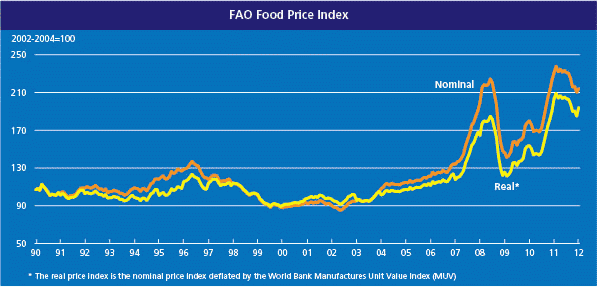 |
A report shows that nearly 30% of families surveyed in India have been forced to eat less food because food prices were 24% higher in 2011 than in 2010. In addition, in many homes children were forced to skip school to supplement family incomes while there were others who could not even "afford a diet containing the bare essentials of milk, eggs and vegetables." Besides India, the study showed similar findings in Bangladesh, Nepal, Peru, Nigeria and Pakistan. As the above graph shows, the price of food has been trending upward since 2002. There has been a lot of volatility since 2008, with sharp spikes upward and downward, but the the overall since 2002 there has been an overall exponential growth trend of the world price of food. This trend is expected to continue until reset by world war. India Today and FAO
(Comments: For reader comments, questions and discussion,
see the 19-Feb-12 World View -- Syria fighting spikes as U.S. operates intelligence drones
thread of the Generational Dynamics forum. Comments may be
posted anonymously.)
(19-Feb-2012)
Permanent Link
Receive daily World View columns by e-mail
Donate to Generational Dynamics via PayPal
Syrian conflict spills over the border into Lebanon
This morning's key headlines from GenerationalDynamics.com.
 |
Violence in Syria continues to spill over into northern Lebanon. The city of Tripoli, Lebanon, is mostly Sunni Muslim, but a single street separates the Sunni factions from the rival Alawite factions. According to one Sunni cleric, "The Assad regime in Syria is sending its agents in every day to destabilise the situation here. Syrians might not actually get their hands dirty, but get their allies in the Alawite community to act on their behalf." BBC
Among Syria's neighbors, only Turkey has until now provided refugee camps for Syria's civilians fleeing the attempts of president Bashar al-Assad to exterminate his own people. Syria's Arab neighbors, Iraq and Lebanon, refuse to establish refugee camps. But now Jordan is putting the finishing touches on a large refugee cample near the border with Syria, to house thousands of Syrians fleeing their homes. Jordan is already caring for several thousand refugees, but the burden has fallen on local communities. The new refugee camps will lift the burden from the locals. The Media Line
We've been here before, but it appears this time that European leaders have run out of time and are so desperate that they will approve the second €130 billion bailout, allowing Greece to avoid default on March 20, when it currently owes a €14.5 billion bond payment. The approval was signaled by a change of position by German Chancellor Angela Merkel. Merkel had favored a complex scheme where bailout money would be doled out to Greece in stages, only as needed, reflecting a lack of trust in Greece politicians, a position she abandoned on Friday. In fact, just about every politician involved in the bailout has changed his position 180 degrees in some way. Additionally Greece will have to take "24 additional steps," before the end of February, mostly things the government has promised but hasn't done so far. However, the crisis is far from over. The extremely complex private sector involvement (PSI) deal where private investors "voluntarily" lose 70-75% of their investments has to be implemented within about two weeks. And even if it all gets done, Greece will still need a third bailout agreement by the end of 2012. Bloomberg and CNN
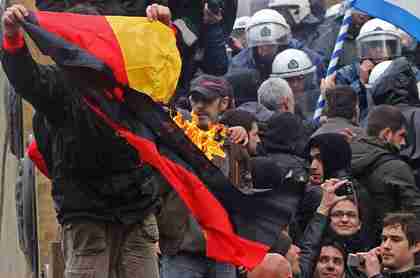 |
The attack on Germany by Greek President Karolos Papoulias has raised raised concerns, as German media are calling it "ominous." On Wednesday, German Finance Minister Wolfgang Schäuble said:
"I am no longer certain that all the political parties in Greece are conscious of their responsibility for the difficult situation in their country."
He also suggested that Greek elections may have to be postponed. Papoulias, a WW II survivor who fought the Nazis, responded:
"I don’t accept insults to my country by Mr. Schäuble. I don’t accept it as a Greek. Who is Mr. Schäuble to ridicule Greece? Who are the Dutch? Who are the Finns? We always had the pride to defend not just our own freedom, not just our own country, but the freedom of all of Europe."
Interestingly enough, I've read several articles on this subject, and they almost always leave out the last sentence of Papoulias' quote, apparently because it's too incendiary. The conservative daily Die Welt wrote:
"In Greece, on the other hand, people continue to play the victim and to look abroad for something to blame their own malaise on. Populist politicians (there) have been particularly focused on the Germans. Instead of reaping thanks for all the transfers of their taxpayer money, (Germans) are now forced to put up with a tongue-lashing. ... The answer [to Papoulias] is simple: Those are all the (countries) that are currently trying to make sure that Greece can pay what it owes and that want to be sure that Athens will also hold up its part of the bargain this time."
The center-right Frankfurter Allgemeine Zeitung wrote:
[It would be] instructive to inquire into the reasons behind [Papoulias's] outburst, especially because he knows Germany well after having studied here. The fact that (Schäuble) said it like it is by describing Greece as a bottomless pit could hardly have warranted it. Indeed, everyone knows that Greek politicians ran up debts, failed to collect taxes and ignored corruption. But, by suggesting that new elections in Greece be postponed to make sure that the country sticks to what it has agreed to, Schäuble has touched on a nerve that is sensitive for two reasons. First, he reminds us that Athens has promised many reforms but only kept its word on a few. Second, having an election date set by foreigners would be just as undemocratic as having an austerity commissioner arrive from Brussels."
It was a festive party atmosphere in Martyrs Square in Tripoli, Libya, on Friday as crowds celebrated the one year anniversary of the uprising that led to being free of Muammar Gaddafi after 42 years. There had been concerns that the uprising would split the country apart along an anciety east-west fault line, but so far that hasn't happened. However, there are widespread concerns about reports detailing arbitrary arrest and torture of former pro-Gaddafi rivals, and concern that clashes between rival militias may yet spiral into a larger war. Reuters
(Comments: For reader comments, questions and discussion,
see the 18-Feb-12 World View -- Greece's bailout may be approved on Monday
thread of the Generational Dynamics forum. Comments may be
posted anonymously.)
(18-Feb-2012)
Permanent Link
Receive daily World View columns by e-mail
Donate to Generational Dynamics via PayPal
U.S. drone strikes kill at least 21 suspected militants in Pakistan
This morning's key headlines from GenerationalDynamics.com.
 |
Members of al-Qaeda in Iraq have infiltrated Syrian opposition groups, and likely executed recent bombings in Damascus and Aleppo, the two largest cities, according to Director of National Intelligence James R. Clapper. These bombings "had all the earmarks of an al-Qaeda-like attack," according to Clapper. He said that al-Qaeda extremists "have infiltrated" opposition groups that "in many cases may not be aware they are there." The "Arab Spring" uprisings have relegated al-Qaeda to the sidelines throughout the Arab world, so this is an opportunity, led by al-Qaeda in Iraq, to regroup. Washington Post
The United Nations General Assembly has passed a resolution condemning the violence in Syria by a vote of 137 to 12. Russia and China vetoed a Security Council resolution two weeks ago, but unlike a Security Council resolution, a General Assembly resolution is purely symbolic, with no binding effect. Nobody can veto a General Assembly resolution, but even so, twelve nations voted against it, including some of Syria's traditional allies: Russia, Iran, China, Venezuela, North Korea, Nicaragua, Bolivia, Ecuador, Belarus, Zimbabwe, Cuba and Syria itself. In addition, there were 17 abstentions. Sky News
The violence in Yemen took a new turn upward on Thursday when a local al-Qaeda leader was killed by his half-brother, sparking armed clashes that lasted most of the day, killing 17. Yemen is the headquarters of Al-Qaeda on the Arabian Peninsula (AQAP). AQAP and its local affiliates, the Partisans of Sharia (Islamic law), have taken advantage of almost a full year of deadly protests against outgoing President Ali Abdullah Saleh to bolster their presence in the south and southeast. AFP
 |
Readers may recall that much of the news last year had to do with topics like the issue of Jewish settlements in the West Bank, President Obama's confrontation with Israel's PM Benjamin Netanyahu, and application to the U.N. to recognize a Palestinian state. However, ever since February 6, when a unity agreement was signed between Hamas and Fatah (Palestinian Authority), the Palestinians appear to have no apparent objective. Hamas and Fatah plan to announce the composition of the unity government on Saturday, but the basic differences between the two organizations will not be overcome by the hybrid government that leaves no one in charge. This comes as other news reports indicate that Hamas's leadership is split over whether to ahead with the reconciliation at all. On the other hand, since Hamas is recognized by the West as a terrorist organization, Israel's government is free to continue as before with new settlements. VOA and Jerusalem Post
Two separate attacks by an unmanned US drone aircraft in north-west Pakistan have killed at least 21 suspected militants, Pakistani security officials say. The missiles struck targets in the North Waziristan tribal region near the Afghan border. Although Pakistan officials have publicly complained about the drone strikes, because they violate Pakistan's terroritory and because they sometimes kill civilians, it's believed that Pakistan's military is secretly cooperating with the drone strikes, with the objective of attacking terrorist militants in Pakistan's tribal area. BBC
(Comments: For reader comments, questions and discussion,
see the 17-Feb-12 World View -- Al-Qaeda in Iraq infiltrating Syrian opposition
thread of the Generational Dynamics forum. Comments may be
posted anonymously.)
(17-Feb-2012)
Permanent Link
Receive daily World View columns by e-mail
Donate to Generational Dynamics via PayPal
Nicolas Sarkozy announces reelection campaign for president of France
This morning's key headlines from GenerationalDynamics.com.
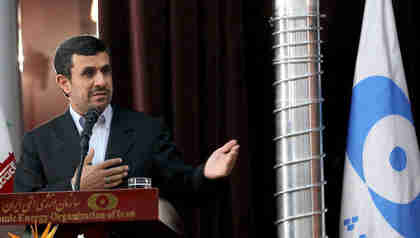 |
Iran's President Mahmoud Ahmadinejad trumpeted on Wednesday major advances in the country's nuclear program in a live nationally televised press event. "I am grateful to the Almighty…for these great achievements we are offering to the people of Iran and all humanity," he said. He announced that a "new generation of Iranian centrifuges" had been installed and put into operation at the country's main uranium enrichment facility at Natanz in central Iran. He said this brought the number of Iran’s operating centrifuges for nuclear enrichment up to 9,000 from 6,000. However, with Parliamentary elections just a few weeks away, the U.S. State Department dismissed the announcements as "hype." Ria Novosti and VOA
No discernable progress was made on Wednesday on the proposed second bailout of Greece, and the recriminations became increasingly bitter. Germany's finance minister Wolfgang Schäuble said that, in case of a complete default by Greece, "we're better prepared than two years ago." His deputy, Steffen Kampeter, compared Greece to a "bottomless pit." Greece's President Karolos Papoulias, who is a World War II survivor and fought in the resistance against the Nazis, said,
"I don’t accept insults to my country by Mr. Schaeuble. I don’t accept it as a Greek. Who is Mr. Schaeuble to ridicule Greece? Who are the Dutch? Who are the Finns? We always had the pride to defend not just our own freedom, not just our own country, but the freedom of all of Europe."
Equally bitter is Greece's finance minister Evangelos Venizelos, who is blaming the European negotiators for the failure to reach a bailout agreement:
"We are continually faced with new terms. In the euro area, there are plenty who don’t want us anymore. There are some playing with fire, domestically and abroad. Some are playing with torches and some are playing with matches. But the risk is equally great."
Greece's politicians are not the only ones who have been delaying reaching crucial agreements necessary to avoid bankruptcy on March 20. Another part of the whole deal is the "haircut" that private investors (mostly banks) will take when the "voluntary" bond swap occurs -- estimated at 75% by France's BNP Paribas, meaning that investors will lose 75% of their original investment. This is known as the "private sector involvement" (PSI) part of the deal. However, this complex bond swap deal is in jeopardy because Europe's interim bailout mechanism, the European Financial Stability Facility (EFSF), has to be ratified by the parliaments of the eurozone nations, and that process hasn't even begun yet, even though it's been known to be a requirement since last October. Without the EFSF ratification, the PSI deal cannot be consummated, and without the PSI, the "voluntary" bond swap can't take place. Kathimerini
Brussels is warning of "devastating" consequences, and the European commission and UK authorities are analyzing ways to mitigate the damage from a complete default on Greece's debt. According to one scenario:
"[On] the day Greece defaults on its debts, the Aegean Sea is awash with small boats in which fleeing Greeks huddle with suitcases full of euros. Guards patrol the border in an attempt to prevent the flight of capital. Things get ugly and there are shootings, captured on film. Despite the best efforts of policymakers in Athens, Brussels and Frankfurt, it proves impossible to contain the panic, which spreads to Portugal and Ireland, the other two countries going through tough austerity programmes in return for bailouts from the EU and the IMF."
The European Central Bank (ECB), concerned about a Greek domino effect, has flooded Europe's banks with cheap money over the past two months. This is the ECB's Long-Term Repo Operations (LTRO) program, which loaned unlimited amounts of euros to banks at 1% interest in December. The banks borrowed about half a trillion euros in December, and it's thought that this money prevented bank failures since then. The ECB plans to open the LTRO floodgates again at the end of this month, and it's possible that €1-2 trillion more cash will flow into banks' portfolios. The LTRO has prevented bank collapses, but it's failed at its principal objective of spurring economic growth, since the LTRO money is just being shuffled from one bank account to another, with little of it going to people or businesses. Guardian
 |
Unsurprisingly, Nicolas Sarkozy announced that he plans to run for reelection as president of France. "Given the unprecedented crisis in which France and Europe find themselves, not to run would have been tantamount to abandoning my post," he said. However, Sarkozy is polling far behind his main rival, Socialist Party candidate François Hollande. Polls give 30% of the vote to Hollande, and 25% to Sarkozy. Two other candidates get most of the rest of the votes in the poll: 17% for Martine Le Pen of the far right National Front, and 12% for Centrist François Bayrou. If, as expected, no candidate gets a 50% majority, then there'll be a runoff election. Polls show that Hollande would win a runoff with 57.5% of the vote, versus 42.5% for Sarkozy. Global Post
German Chancellor Angela Merkel has previously indicated through leaks that she would consider a Hollande victory to be a disaster. Hollande has promised to rollback Sarkozy's pension reform that increased the retirement age to 62. In addition, he's called for an EU fiscal union and using the European Central Bank as a lender of last resort - positions rejected by Merkel. Deutsche Presse-Agentur (DPA)
(Comments: For reader comments, questions and discussion,
see the 16-Feb-12 World View -- Germany and Greece trade insults as bailout talks stall
thread of the Generational Dynamics forum. Comments may be
posted anonymously.)
(16-Feb-2012)
Permanent Link
Receive daily World View columns by e-mail
Donate to Generational Dynamics via PayPal
China's Xi Jinping receives reassurance on Taiwan from Barack Obama
This morning's key headlines from GenerationalDynamics.com.
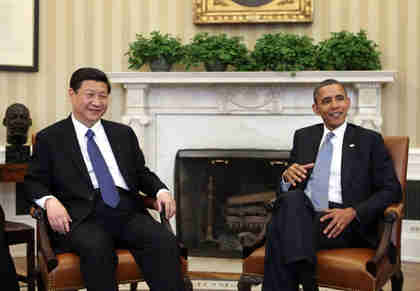 |
China's Vice-President Xi Jinping met US President Barack Obama at the White House in Washington on Tuesday morning. Obama said it's vital for the US to have strong relations with China and his country welcomes the peaceful rise of China. Xi reiterated Beijing's position on the Taiwan issue, urging Washington to conform to the spirit of the three joint communiques underpinning the China-US relations. He called on the US side to safeguard, with concrete action, the peaceful development of the relations across the Taiwan Strait and the overall development of China-US relations. Xi said the Taiwan issue concerns China's sovereignty and territorial integrity, and remains, as always, the most important and most sensitive issue in China-US relations. Beijing appreciates Washington's repeated declarations of its commitment to the one-China policy on various occasions, Xi said. Xi is expected to replace Hu Jintao as China's president later this year. China Daily
With large Tibetan regions of China sealed off from the outside world in the last couple of weeks, the head of Tibet's exile government is warning that there's a major crackdown occurring away from the eyes of the world. February 22 is the Tibetan New Year, and March 10 is the anniverary of Tibet's failed 1959 uprising, Tibetans are expected to demonstrate, and China's response is expected to be bloody. Foreign tourists have been ordered to leave the region and Western reporters are effectively barred, making it impossible to know the reality of the situation. AP
 |
A man with an Iranian passport blew his own legs off when a bomb he was carrying exploded as he was about to throw it at police. No one was killed in two other blasts that occurred around the same time, but two other suspects were arrested. Police say that the bombs were intended for "foreign nationals" in Thailand. Since the blasts came a day after terrorist bombings in India and Georgia targeted Israeli embassy personnel, Israel's Defence Minister Ehud Barak blamed the series of explosions on Iran. Iran denies they were involved, and one analyst says that the attacks in India, Georgia and now Thailand have all been highly amateurish. "[They] lack the sophistication that would normally be expected from an operation executed by either Hezbollah or Iran's own external operations wing, the Quds Force." Bangkok Post
Italy's interim, unelected prime minister Mario Monti crushed Rome's hope to host the 2020 Summer Olympic Games when he announced that his government would not support the bid, because of the economic crisis.
"The government doesn't think it would be responsible with the condition Italy is it to guarantee [the bid]. ... Our government was called to operate in an emergency and asked for important sacrifices."
Rome last hosted the Summer Olympics in 1960 when it was enjoying a post-World War II economic boom dubbed the Italian Economic Miracle. Adnkronos International (Italy)]]
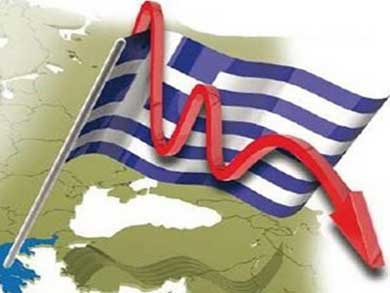 |
Greece's gross domestic product (GDP) contracted in 2011 at the rate of 6.8%, the highest on record, and much worse than even the most pessimistic forecasts. This comes after reports that the unemployment rate is above 20% of the work force. Worse still, with the measures the government has just agreed to for the containment of public spending and the reduction of salaries in the private sector, there are hardly any grounds for anyone to claim that the economy will be able to post even a minimal rebound this year. Kathimerini
The Eurozone continued to turn the screws on Greece by canceling a Wednesday meeting of the Eurogroup finance ministers that had been expected to approve Greece's second debt bailout deal. Eurogroup Chairman Jean-Claude Juncker called off the meeting, because Greece has not yet met its commitments for the bailout meeting. Juncker said that Greek politicians' insistence on limiting cuts to auxiliary pensions has caused a shortfall of €325 million in spending cuts that have to be made up another way. Juncker said that, in addition, he hadn't received the signed letters of commitments from Greece's political leaders that whoever wins the April elections will implement the committed austerity measures. They include 15,000 public sector layoffs this year, and a 22% reduction in the minimum wage. Kathimerini
For the most part, the "Arab Spring" violence of the last year has been non-sectarian, and more generational. But the violence in Syria has been getting increasingly sectarian in the last few months, as regime of Bashar al-Assad, largely supported by Alawites, has been specifically targeting Sunni Muslims. Now, Sunni vs Shia sectarian violence is increasing in eastern Saudi Arabia as gunfights have been increasing since October. In Bahrain, protests by the Shia majority against the Sunni monarchy have been increasing, on the first anniversary of last year's uprising. Shia Muslims in Saudi Arabia face "significant political, economic, legal, social and religious discrimination condoned by the government," according to a 2009 U.S. State Dept. report. It's widely believed that Iran is stoking the sectarian violence. Bloomberg
(Comments: For reader comments, questions and discussion,
see the 15-Feb-12 World View -- Eurogroup cancels bailout meeting as Greece's economy collapses
thread of the Generational Dynamics forum. Comments may be
posted anonymously.)
(15-Feb-2012)
Permanent Link
Receive daily World View columns by e-mail
Donate to Generational Dynamics via PayPal
Germans approve Greece bailout even though they know it won't work
This morning's key headlines from GenerationalDynamics.com.
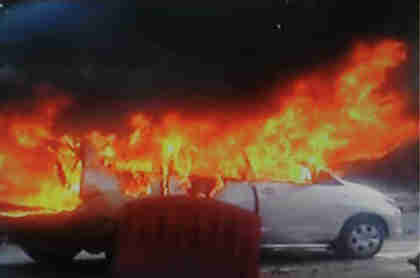 |
Israel accused Iran and its Lebanon ally Hizbollah of being behind the two failed attempts, in India and Georgia, to kill Israel's embassy staff with bombs. In New Delhi, a bomb wounded an Israeli embassy official, her driver and two passers-by. In Tbilisi, an embassy employee who is not an Israeli, was targeted with a bomb attached to his car, but he saw the bomb and called police to defuse it. Israel had already put its foreign missions on high alert because Sunday was the fourth anniversary of the assassination in Syria of Imad Moughniyeh, a military mastermind of Hizbollah -- an attack widely assumed to be the work of Israel's agents. Since then, there have been several attempted Hizbollah attacks against Israeli targets, but they've all been thwarted. Iran is denying that they're responsible for the attacks in India and Georgia, though in the past they've vowed to get revenge for Israeli attacks on Iranian targets. Reuters and Jerusalem Post
On Monday, 30 civilians, including two children, were killed in violence by the the regime of Syria's president Bashar al-Assad. More than 680 were killed last week. Reflecting the seriousness of the situation, diplomats at the United Nations made one explosive statement after another expressing moral outrage and insisting that the violence had to stop -- NOW. CNN
After two years of fighting Greece's debt crisis, hardly anyone believes that the current strategy will work -- not in Athens, Brussels or Berlin -- despite Sunday's passage of austerity measures by Greece's Parliament. German Finance Minister Wolfgang Schäuble was so disgusted that he wanted to cancel last Thursday's Eurogroup meeting, after Greece's politicians had failed day after day to reach fundamental agreements, but he was overruled by the other ministers. But it turned out that Schäuble was right: The Greeks had failed to provide important documents, including an agreement with private investors, and written pledges by Greek leaders to abide by agreed austerity measures. The Greeks hadn't even submitted an application for fresh financial assistance. The Germans have decided that there is no hope, and that any attempt to bail out Greece will end in failure. HOWEVER, they've figured out that a complete default and bankruptcy by Greece will cost Germany €71.7 billion euros, with unpredictable consequences. THEREFORE, the Germans have decided to continue with the next bailout of Greece, because they feel it's cheaper to bail out Greece than to deal with a Greek default. Der Spiegel
(Comments: For reader comments, questions and discussion,
see the 14-Feb-12 World View -- Israel accuses Iran for attempted embassy staff bombings
thread of the Generational Dynamics forum. Comments may be
posted anonymously.)
(14-Feb-2012)
Permanent Link
Receive daily World View columns by e-mail
Donate to Generational Dynamics via PayPal
China's Xi Jinping visits Washington
This morning's key headlines from GenerationalDynamics.com.
 |
China's vice president, and presumptive president-to-be, Xi Jinping is visiting Washington this week. 2012 is the year of the next once per decade generational change in China's leadership, and if everything goes smoothly, then Xi will replace Hu Jintao as president of China later this year. The generational shift will be more tumultuous than in the past, because the existing leadership that grew up during Mao's Communist Revolution will be replaced with a younger generation (like our Boomers) with no personal memory of the bloody revolution, and with no fear of confrontations that might lead to violence. Today, there's an important ideological split. One camp promotes a Maoist revival, completely with red-song campaigns and revolutionary rallies. The other camp, favored by Xi, is more liberal, stressing the rule of law and land-rights protection. Wall Street Journal (Access)
With the regime of Syria's president Bashar al-Assad continuing to treat his people as cockroaches to be exterminated, the Arab League met on Sunday to decide what to do next. The result was another silly, toothless proposal: The United Nations Security Council should approve a joint peacekeeping force, with the Arab states. There are several minor problems with this proposal. First, al-Assad would never allow it. Second, Russia and China would veto the proposal. And third, there's no peace to keep anyway. AP
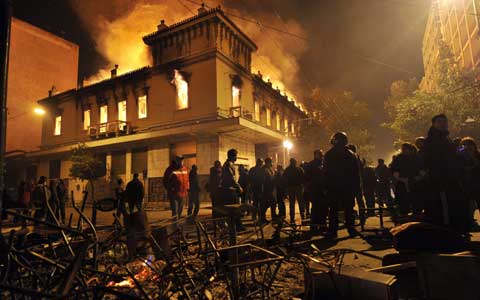 |
Gangs of self-styled anarchists in hoods used Molotov cocktails to torch shops in Syntagma Square in central Athens, Greece. Hooded youths smashed the facades of several stores and witnesses reported instances of looting. Earlier, groups of youths had clashed with police, pelting them with rocks and firebombs. Police responded by firing large clouds of acrid tear gas. Branches of major foreign chains and banks were targeted with a branch of Starbucks among those to go up in flames. On the streets many businesses were ablaze, including the neo-classical home to the Attikon cinema dating from 1870 and a building housing the Asty, an underground cinema used by the Gestapo during World War Two as a torture chamber. Kathimerini
After a stormy day both inside and outside Greece's Parliament building, the lawmakers approved, by a vote of 199 to 74, a collection of austerity measures demanded by the European Union (EU) and International Monetary Fund (IMF) as a condition for receiving a €14.5 billion bailout loan need to prevent Greece from bankruptcy on March 20. The austerity measures included a 22% reduction in minimum wage, 15,000 civil service job cuts this year, and reductions in pensions. Bloomberg
The Parliamentary passage of austerity measures does not mean that the bailout money approval is a fait accompli. There is still another major task that's been hovering over Europe for several months, and it's easily as complex as the passage of the austerity measures. It's the "private sector involvement" (PSI) deal, where private investors holding short-term toxic Greek bonds "voluntarily" exchange them for bonds guaranteed by the EU -- 30-year bonds worth 70% less than the nominal value of the toxic bonds. There are hard issues still to be decided: Is the 70% haircut enough? Should the European Central Bank (ECB) take any loss on the €50 billion in Greek bonds in their portfolio? Will enough investors be willing to participate "voluntarily"? Will it be possible to avoid a "default event" that will trigger the payment of credit default swaps (CDSs), with a possible chain reaction with unpredictable results? Kathimerini
It's been over three months since hedge fund firm MF Global Holdings Ltd. collapsed, and $1.2 billion in customer funds was "vaporized" in the last few days. As usual, the Obama Justice Department is refusing to investigate what happened to that money, according to blogger Francine McKenna. In this case, the reason is pretty obvious: the CEO was Jon S. Corzine, a favorite of the White House, and there's little question that the loss of the $1.2 billion was criminal fraud. Presumably, the fraud was committed by the pals of Administration officials. Forbes
(Comments: For reader comments, questions and discussion,
see the 13-Feb-12 World View -- Greece approves austerity measures among riots as Athens burns
thread of the Generational Dynamics forum. Comments may be
posted anonymously.)
(13-Feb-2012)
Permanent Link
Receive daily World View columns by e-mail
Donate to Generational Dynamics via PayPal
Ahmadinejad vs Supreme Leader feud simmers as Iran's elections approach
This morning's key headlines from GenerationalDynamics.com.
 |
In a dramatic, emotional televised address to the nation, Greece's interim Prime Minister Lucas Papademos said that parliamentary lawmakers must accept the harsh austerity program because the alternative, a disorderly Greek default, would bring chaos to the country:
"We realize this program entails painful sacrifices for the Greeks, but a default would condemn Greece to an uncontrolled adventure. ... We look at the Greek people in the eyes with full realization of our responsibility.This program will secure conditions of safety, confidence and restore the competitiveness of our economy. It will see the country return to growth, probably in the second half of next year.
The agreement for the new program has the support of the country’s two main parties and secures the future of our country in the eurozone. It also reflects the extreme conditions of need our country lives in.
This is the fight of our generation. It would be the biggest defeat of post-1974 Greece if this country were to default and drop out of the eurozone, when countries far poorer than us are making a hard effort to enter the euro.
We will not emerge from the crisis without sacrifices.
What is patriotic today is not drop our shields but make the correct decisions that enhance our position in Europe and the world. This is absolutely necessary for us to protect our national interest.
It will not end within just one year. It will require a long effort and cooperation of political forces. But above all, it will require faith in our abilities."
Antonis Samaras, leader of the conservative New Democracy party, and George Papandreou, former prime minister and leader of the socialist Pasok party, both invoked party discipline on Saturday, and demanded that members of their parties vote "yes" on Sunday's vote on austerity measures. Saturday’s stormy meeting of Pasok led to a number of deputies resigning their seats. Several others have made it known that they will vote "no" on Sunday. "We have to vote Yes, not because it is pleasant but because it will give Greece some time to stand on its feet," said Papandreou. Kathimerini
The dramatic events in Greece are fascinating from the point of view of generational theory, and are providing a look ahead at what's coming in other countries, including the United States. Most major countries today are in a generational crisis era, as the generations of survivors of World War II have disappeared. As we've been discussing for years, a characteristic of this era is political bickering and governmental paralysis that only gets worse as time goes on. The paralysis ends with the "regeneracy," referring to the regeneracy of civic unity for the first time since the end of WW II. The regeneracy is a series of one or more events that panic the nation and put the nation and its way of life in danger, forcing everyone to unify behind the political leadership. Right now, in real time, we're looking at the first major regeneracy in the current generational crisis era. These regeneracies will occur in other countries, leading up to the Clash of Civilizations world war. Greece's vote on Sunday will change the direction of Europe and the world because it will soon be apparent to everyone that Greece's problems are completely unsolved, leading to increased social unrest and the return of old national and ethnic splits for the first time since World War II. "Basics of Generational Dynamics"
 |
Russia and China continue to be isolated internationally over their veto of the U.N. Security Council resolution on Syria, sponsored by the Arab League, while Syria's president Bashar al-Assad continues to treat huge numbers of Arab Syrians as cockroaches to be exterminated. On Saturday, activists stood outside the Russian embassy in Tel Aviv chanting slogans, such as “Get out Assad! Get out you liar!, you killer!", in Arabic, Hebrew and English. However, the lights in the embassy remained off. Jerusalem Post
Lebanon's army is struggling to bring under control sectarian clashes between Alawites and Sunni Muslims in the northern Lebanon city of Tripoli, near the border with Syria. The Alawites are a minority sect of which Syria's president Bashar al-Assad is a member, while al-Assad's extermination regime has particularly targeted Sunni Muslims in Syria. The big danger is not a civil war within Syria, which is extremely unlikely during Syria's generational awakening era, but rather a wider regional war in neighboring states, especially Saudi Arabia, Yemen, Israel, the Palestinian territories, and Egypt. The fighting on Friday involved gunfights and the use of rocket-propelled grenades and began after Friday midday prayers, when people pour out of mosques onto the streets. Six civilians and six soldiers were wounded in the last two days. Daily Star (Beirut)
 |
Iranian President Mahmoud Ahmadinejad announced on Saturday that the country plans to unveil a series of big new achievements in nuclear technology in coming days. "The world will witness inauguration of a number of big achievements in the field of nuclear (technology) in coming days," Ahmadinejad said, addressing millions of enthusiastic demonstrators in Tehran who had flocked to the streets to celebrate the 33rd anniversary of the victory of the Islamic Revolution in Iran. He also underlined that the country's progress and advancement in the field of nuclear technology was achieved despite the pressures of the world arrogant powers, and added all needs of the Iranian nation to the nuclear technology will be met by Iran's talented scientists in the near future. Fars News Agency (Tehran)
Web users in Iran have reported a sharp reduction in internet speed, and lack of access to several prominent web sites, including Yahoo and Facebook. For a while on Thursday, sites that use the SSL protocol, used principally by e-commerce sites to encrypt credit card numbers and other customer data, could no longer be accessed, presumably to prevent Iranians from sending encrypted messages of any type. The regime fears protests on the 33rd anniversary of the Great Islamic Revolution, and before parliamentary elections scheduled for March 2. Activists have called for silent protests on February 14. Radio Zamaneh
 |
The first public hints of the feud between Iran's president Mahmoud Ahmadinejad and the Supreme Leader Ayatollah Ali Khamenei came after the June, 2009, presidential election, when Khamanei refused to embrace Ahmadinejad, who then had to force Khamanei to accept a kiss on the shoulder. It became extremely bitter last year when the two leaders bitterly attacked each other, forcing members of the parliament to choose sides. Now, a new parliamentary election is scheduled for March 2, and it represents a new high-stakes confrontation between Ahmadinejad and Khamanei. Tehran and other big cities tend to favor Khamanei, and so Ahmadinejad's supporters are focusing on the far-flung and poorer regions of the country, by buying votes with money and promises of more money. It turns out that the Western sanctions against Iran have indirectly benefited Ahmadinejad: They've caused the value of Iran's rial currency to nosedive, while the government still brings in dollars from oil sales. This gives the government plenty of vote-buying money. AP
As I've been writing for many years, Iran is basically a schizophrenic nation. Its top leadership, starting with the supreme leader, are survivors of the 1979 Great Islamic Revolution, an extremely bloody civil war. Like generational crisis war survivors in any country, these leaders imposed austere rules and institutions designed to prevent another bloody civil war, and this has led them to adopt a harsh anti-Western attitude. But the generations born after the crisis war have no such motivation, and Iran's younger generations are, in fact, generally pro-Western and have no particular desire to see Israel pushed into the sea. As months go by, people in these younger generations are displacing the war survivors, moving Iran's policies closer to the West. This change is occurring throughout society, even within the Islamic Revolution Guards Corps (IRGC). It appears more and more that Ahmadinejad is siding with the younger post-war generation against Khamanei and the geezers in the survivor generations. This is Iran's generational awakening era, and like America's awakening era in the 1960s, the politics have become chaotic. At some point there will have to be an awakening era climax which, like President Nixon's resignation in 1974, will resolve the political battle between younger and older generations and produce a winner.
(Comments: For reader comments, questions and discussion,
see the 12-Feb-12 World View -- Dramatic vote in Greece on Sunday will affect the course of Europe and the world
thread of the Generational Dynamics forum. Comments may be
posted anonymously.)
(12-Feb-2012)
Permanent Link
Receive daily World View columns by e-mail
Donate to Generational Dynamics via PayPal
Watch out for clueless bozos and paid shills.
On Thursday on CNBC, Ron Baron, chairman and CEO of Baron Capital, said that "Because everyone's afraid to invest, stocks are at the lowest level, the most attractive level, in my lifetime." He added that he expected the stock market to follow the path of the 1980s, and to rise sharply in the next few years.
 |
Ron Baron, chairman and CEO of Baron Capital, was simply lying. In his lifetime, stocks were the cheapest in 1980, when the S&P 500 Price/Earnings ratio index ("valuations") was 6.79. Today, according to the Wall Street Journal, the P/E ratio index is at 15.14, higher than the historical average of 13.91.
So Ron Baron, chairman and CEO of Baron Capital, lied on CNBC. We shouldn't consider this surprising. In the last few years, financial institutions around the world have knowingly created tens of trillions of dollars of toxic synthetic securities and purposely used them to defraud investors. Lloyd Blankfein, CEO of Goldman Sachs, testified before Congress that his criminal fraud was "God's work." It would be nice to see him and other financial CEOs in jail continuing their God's work by manufacturing license plates, but the Obama Justice Department refuses to prosecute or even investigate this fraud. (See my recent article "Proposed explanation for repeated Jewish persecution throughout history" for how Boomers and Generation-Xers interacted in creating this fraud.)
So, with the Obama Justice Department refusing to prosecute or even investigate anyone, the fraudulent activities continue. People like Baron continue to lie in order to continue to collect fat commissions and award themselves million dollar bonuses. Mainstream media like CNBC and Bloomberg TV invite these people on the air because they return the favor by advertising. Politicians cheer them on in return for huge campaign donations. Even if there are only a few crooks in financial institutions, in the media and in Washington, they can do an unlimited amount of damage because they can continue to commit criminal fraud at will, without fear of prosecution.
As blogger Lee Adler recently pointed out, commenting on the nonsense from economists on the latest unemployment claims number:
"It seems to me that the big surprise is that any economists were surprised, but then, knowing how great the economics profession is at forecasting, I’m really not surprised. The vast majority of economists are either clueless bozos or paid shills, often both."
I like "clueless bozos or paid shills, often both." I'm going to use that.
The clueless bozos and paid shills are talking about the collapse in stock valuations as good news, because it's time to buy. (It's ALWAYS time to buy. If valuations are going up, it's time to buy because they're going up. If valuations are going down, it's time to buy because stocks are cheap. Say anything to earn a fat commission.)
However, if you look at the above graph, then you can see that something quite different is going on. Valuations have fallen to the 5-6 range three times in the last century, most recently in 1980. Despite the claims of the bozos and shills, there's absolutely no reason to believe that it won't happen again, and you can see from the graph that valuations appear to be headed back to those levels right now. By the Law of Mean Reversion, valuations will probably fall well below 5, since they've been so astronomically high since 1995.
One thing about the above graph that's very interesting is that valuations reach these lows at approximately 32 year intervals, and it looks like that's going to happen again. This may indicate some kind of fundamental generational financial cycle that I don't understand. At any rate, this should be of interest to the chartists and the numerologists of the world.
In 2005, I wrote "Ben S. Bernanke: The man without agony," in which I ridiculed the views of the soon-to-be Fed Chairman because he seemed to have no idea what was going on. For example, he recognized that real estate prices had risen 25% in two years, but he rejected a real estate bubble, because these increases "largely reflect strong economic fundamentals," such as strong growth in jobs, incomes and the number of new households.
I contrasted Bernanke's statements to those of outgoing Fed Chairman Alan Greenspan, who was expressing real agony and anxiety over what was going on:
"To some extent, those higher [stock and housing] values may be reflecting the increased flexibility and resilience of our economy. But what [investors] perceive as newly abundant liquidity can readily disappear. Any onset of increased investor caution elevates risk premiums and, as a consequence, lowers asset values and promotes the liquidation of the debt that supported higher asset prices. This is the reason that history has not dealt kindly with the aftermath of protracted periods of low risk premiums."
At this point, it's clear that Greenspan's agony was right, and Bernanke's contentment and complacency were wrong. Bernanke's entire career as professor of economics at Princeton was based on his work that "proved" that the 1930s Great Depression could have been prevented if the Fed had lowered interest rates a little more. But today, after four years of near-zero interest rates and massive liquidity infusion via quantitative easing and fiscal stimulus and bailouts, it's no understatement to say the Bernanke's life work has been proven to be completely wrong. (The same could be said of other Princeton University economists, including Nobel Prize winners.)
I've said several times in the past that I respect Ben Bernanke as a man, not because he's been right (he obviously hasn't), but because he's honest, unlike the liars and crooks in Washington, on Wall Street, and on CNBC.
So it's of interest that Bernanke is now beginning to sound like Greenspan did in 2005. He testified the following to Congress a few days ago:
"Even the prospect of unsustainable deficits has costs, including an increased possibility of a sudden fiscal crisis. As we have seen in a number of countries recently, interest rates can soar quickly if investors lose confidence in the ability of a government to manage its fiscal policy. Although historical experience and economic theory do not indicate the exact threshold at which the perceived risks associated with the U.S. public debt would increase markedly, we can be sure that, without corrective action, our fiscal trajectory will move the nation ever closer to that point."
Unfortunately, Bernanke still doesn't entirely get it, since he's still clinging to his prior beliefs that bubbles don't exist and he's blaming the financial crisis on Congress. But the point he's making is the same as the point that Greenspan made in 2005: That investors are currently underestimating market risk, and that history will show that this leads to a sudden fiscal crisis.
I've been saying for years that the stock market is going to fall to the Dow 3000 level or lower, and that hasn't changed.
Trillions of dollars in quantitative easing in the U.S., Europe and China were supposed to generate growth, and that would have happened prior to the 2000s. But today, in a generational crisis era, people have been badly burned, and people and businesses are hoarding cash. (In macroeconomic terms, the velocity of money has been crashing.)
For almost ten years, I've been listening to clueless bozos and paid shills predict "hyperinflation next year," and it hasn't happened, and shows no signs of happening. This prediction is made by two categories of shills:
The signs continue to be, as they have been since 2007, that we're in a massive worldwide deflationary spiral, meaning that cash will be increasingly valuable.
My advice has been the same for years: Preserve your assets. Store cash in your mattress, in your basement, or in FDIC insured bank accounts. If you must invest, purchase short-term Treasuries. Don't risk everything for a couple of percentage points interest.
(Comments: For reader comments, questions and discussion,
see the 11-Feb-12 News -- Price/earnings ratio (valuations) trending toward collapse
thread of the Generational Dynamics forum. Comments may be
posted anonymously.)
(11-Feb-2012)
Permanent Link
Receive daily World View columns by e-mail
Donate to Generational Dynamics via PayPal
Political crisis in Greece raises fears of 'social explosion'
This morning's key headlines from GenerationalDynamics.com.
 |
At a Washington press conference on Friday, Turkey's Foreign Minister Ahmet Davutoglu said that when he meets on Monday with Secretary of State Hillary Clinton, he'll propose new ways to end the violence in Syria. He didn't provide any details, but repeated the standard statement, "What we need today is to send a strong message to the Syrian people that they are not alone." Zaman (Ankara)
In Saudi Arabia, King Abdullah Bin Abdul Aziz said the failure of the UN Security Council to pass a resolution asking the Syrian leader to step down has shaken the world's confidence in the international organisation. He said the decision by Russia and China to veto the UN action was an "unfavourable" move. King Abdullah said the world can't be ruled by the countries on the Security Council alone, but he didn't elaborate. Russia escalated the war of words by accusing the West of arming the Syrian opposition and warning that it will resort to "drastic measures" if the interference doesn't stop. Deputy Foreign Minister Sergei Ryabkov said: "Western states inciting Syrian opposition to uncompromising actions, as well as those sending arms to them, giving them advice and direction, are participating in the process of fomenting the crisis..." Gulf News
After the Arab League's U.N. Security Council resolution on Syria was vetoed by Russia and China, the League will meet on Sunday in Cairo to decide on its next steps. One possibility will be to submit the resolution to the U.N. General Assembly, where it will probably pass, but will have no force of law. However, many people are saying that the United Nations is a useless dead end for stopping the violence in Syria. Bloomberg
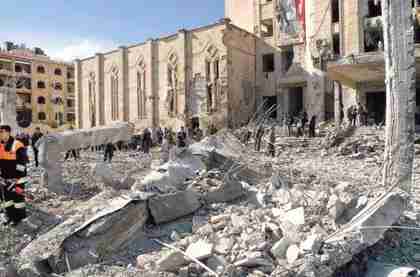 |
Aleppo, an industrial center, the second richest city in Syria, and strong supporters of the regime of president Bashar al-Assad, had largely escaped much of the bloodshed occurring in other cities until Friday, when two suicide car bombers struck security compounds, killing 28 people and injuring hundreds. The regime accused the opposition of perpetrating the car bombs, while the opposition said that regime had arranged for the bombings in order to justify their violence. In any normal country, the latter possibility would be considered absurd, but in Syria, the al-Assad regime has been treating its own people as cockroaches to be exterminated, and it's quite possible that they what the opposition accused them of. AP
Rumors have been circulating on the internet that North Korea's new leader Kim Jong-un has been assassinated in Beijing, and that a coup is under way. However, the U.S. intelligence community says that they have found no evidence to support these rumors. CNN
Egypt’s credit rating was downgraded by Standard & Poor’s, which cited a plunge in the country’s foreign reserves and persistent political instability. "Egypt’s external position has deteriorated and is likely to weaken further, absent stabilization in the domestic political situation alongside external financial support," S&P said. Bloomberg
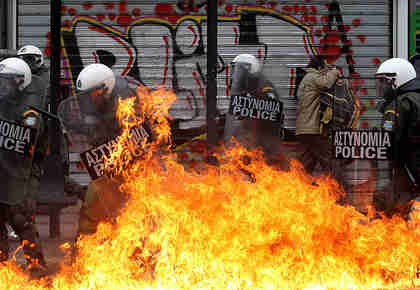 |
The Eurogroup finance ministers are demanding that Greece must go well beyond just promising austerity measures. The parliament must pass them into law this weekend, and then, with elections scheduled for April, each party leader must sign an agreement committing to the austerity program if that party wins the election. According to Eurogroup chief Jean-Claude Juncker:
"In short: no disbursement without implementation. We can’t live with this system while promises are repeated and repeated and repeated and implementation measures are sometimes too weak."
However, Greece's unions struck for the second time this week, with leaders probably believing that they can get the EU to back down on their demands. Several deputy ministers resigned from the government of interim prime minister Lucas Papademos, and the leader of the small Popular Orthodox Rally party (LAOS), Giorgos Karatzaferis, said that he would vote against accepting the austerity measures:
"What has particularly bothered me is the humiliation of the country. Clearly Greece can’t and shouldn’t do without the European Union but it could do without the German boot."
But Papademos said that Greece MUST accept the austerity measures:
"A disorderly default would plunge our country in a disastrous adventure. It would create conditions of uncontrolled economic chaos and social explosion...sooner or later, (Greece) would be led out of the euro. This is an hour of historic responsibility."
The "Kick the Can Theory" that I proposed last year would indicate that some way will be found to prevent a Greek default when its next €14.5 billion bond payment is due on March 20, and that the crisis will be revived again a few weeks later. The next Eurogroup meeting is scheduled for Wednesday, February 15. Bloomberg and AFP
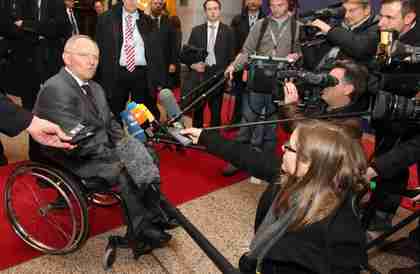 |
Now that Greece's problems are just a short skip and a jump away from resolution, it appears that Portugal is next. Germany' Finance Minister Wolfgang Schäuble was overheard in a private conversatioin with his counterpart from Portugal promising "adjustments" in Portugal's bailout package, apparently implying that a second bailout could be done. Der Spiegel
From February 7, 2010:
"Greece is struggling to persuade financial markets it can restrain the European Union’s largest budget shortfall without outside assistance, while borrowing costs are also rising for Portugal and Spain. Credit-default swaps on the debt of all three countries rose to record highs this week.European finance ministers said they will help ensure Greece tackles its deficit and European Central Bank President Jean-Claude Trichet said the bank is “confident” the country will cut its gap below the EU’s limit of 3 percent of gross domestic product in 2012 from 12.7 percent. U.S. Treasury Secretary Timothy F. Geithner said European officials had committed to handle Greece “with great care.”
“The message was clearly that the European members of the Group of Seven have confirmed the substance and significance of the plan put together by Greece,” French Finance Minister Christine Lagarde said. “The European members of the G-7 will make sure it is managed.”
Plus ça change, plus c'est la même chose. Bloomberg, Feb 7, 2010
(Comments: For reader comments, questions and discussion,
see the 11-Feb-12 News -- Price/earnings ratio (valuations) trending toward collapse
thread of the Generational Dynamics forum. Comments may be
posted anonymously.)
(11-Feb-2012)
Permanent Link
Receive daily World View columns by e-mail
Donate to Generational Dynamics via PayPal
China faces mass protests by Tibetans
This morning's key headlines from GenerationalDynamics.com.
 |
Greek politicians, working through much of Thursday night, and Greece's Finance Minister Evangelos Venizelos announced an austerity agreement with great fanfare, but it was immediately rejected as inadequate by the "troika" of the International Monetary Fund (IMF), European Central Bank (ECB), and European Union (EU). The Greeks had been required to find €3.3 billion in budget reductions, but the political parties could not agree on pension reductions, so they ended up almost half a billion euros short. Analysts had hoped that the Eurogroup finance ministers would approve Greece's second bailout, for €130 billion, on Thursday. Instead, EU officials postponed a decision until next week. Until then, the Greeks will have to find the additional savings, and then get the Parliament to agree to them on Sunday or Monday. Kathimerini and Guardian
The basic problem is that the Greek politicians are not trusted. Greece joined the eurozone by using fraudulent accounting for years, until the debts overwhelmed it. Then, Greece was given a €110 bailout in May of 2010. When it turned out not to be enough, the Europeans blamed the failure on Greece not fulfilling the austerity conditions of the bailout that it had committed to. The Europeans finally agreed to a new additional €130 billion bailout in July 21 of last year, provided that the Greeks implement new austerity measures. The Greeks have been stalling for months, and finally reached an agreement on Thursday morning that was rejected. Now the troika is demanding that the austerity measures pass Greece's parliament on Sunday or Monday. And since Greece faces new elections in April, the troika is demanding that the leaders of each of the three parties sign a letter committing to implement the austerity commitments, in case that party wins the election. Bloomberg
It's already clear that the €130 billion second bailout will not be enough, and a third bailout of €15-20 billion will be required. But on Thursday it was announced that Greece's jobless rate rose to a fresh record of 20.9% in November, up from 18.2% in October. This means that even the €15-20 billion third bailout will not be enough. Kathimerini
China has cordoned off a vast region of western Sichuan province and parts of Qinghai province, in reaction to what are apparently large scale protests and riots by Tibetans. BBC reporters attempting to visit the region and were blocked, arrested for nine hours, and harassed. Thousands of Tibetans defied a security crackdown on Wednesday shouting slogans and carrying banners calling for a "free Tibet," the release of all Tibetan political prisoners, and the return of Tibet's spiritual leader the Dalai Lama. Wednesday was also the day of the latest Tibetan self-immolation in protest against China, the 21st such protest in two years. These self-immolations are of extreme concern to the Chinese security forces, since one of them may trigger a widespread protest, as happened in Tunisia. Radio Free Asia and BBC
 |
With tensions between Argentina and the UK over the Falklands Islands growing, on the 30th anniversary of the Falklands war in which the UK defeated Argentina, Argentinians have been further infuriated when Argentina's president Cristina Fernandez de Kirchner was indirectly called a "bitch" by the Penguin News, a Falklands newspaper. In a story about her vitriolic speech about the Falklands, called the Malvinas Islands by Argentinians, the author included a photo of Kirchner which had a filename of "bitch.jpg". Daily Mail
As the bloodbath continues in Syria, with president Bashar al-Assad treating his own people like cockroaches to be exterminated, Germany's Foreign Minister Guido Westerwelle announced on Thursday that four members of Syria's embassy in Germany have 72 hours to leave the country. This follows the arrest, on Tuesday, of two persons suspected of spying on Syrian opposition members demonstrating in Germany against the Assad regime. Westerwelle implied that the expulsions were linked to the arrests without actually saying so explicitly. According to a statement, "German government made clear its position to not accept actions against Syrian members of the opposition in Germany." CNN
(Comments: For reader comments, questions and discussion,
see the 10-Feb-12 World View -- Austerity negotiators in Greece fail to meet another deadline
thread of the Generational Dynamics forum. Comments may be
posted anonymously.)
(10-Feb-2012)
Permanent Link
Receive daily World View columns by e-mail
Donate to Generational Dynamics via PayPal
Tension grows between Egypt and U.S. over arrest of Sam LaHood
This morning's key headlines from GenerationalDynamics.com.
 |
Led by Greece's interim prime minister Lucas Papademos, leaders of the three major political parties remained deadlocked on issues such as reducing pensions by 15% and reducing the minimum wage by 22% or more, from its current rate of €751 per month. A meeting of the Eurogroup finance ministers to discuss the bailout has been rescheduled several times because of delays in Athens, but Eurogroup chief Jean-Claude Juncker has confirmed that the meeting will go ahead on Thursday evening. Kathimerini
Turkey's Foreign Minister Ahmet Davutoglu has ruled out military intervention in Syria and said there is still time for diplomatic efforts, repeating the same position that Turkey has been taking for months. When asked about establishing a "buffer zone" region on Syrian soil where unarmed citizens can flee for protection, something that Turkey itself had suggested several months ago, Davutoglu evaded the question. There have been unsubstantiated claims that morale is falling among soldiers in Syria's army, and my guess is that Turkey and others are hoping that the army itself will force president Bashar al-Assad out of office. This is actually not an unreasonable hope, since Syria is in a generational awakening era, a time when such things happen without a full-scale war. In the meantime, the regime seems to be determined to obliterate as many of its own unarmed people as it can, with violebt military assaults on residential neighborhoods escalating every day. Zaman (Ankara)
Sam LaHood, the son of U.S. Transportation Secretary Ray LaHood, is among 43 people, including 19 American citizens, being criminally charged in Egypt with such things as failing to pay taxes, entering the country on tourist visas and training political parties. Those charged are all employees of NGOs (non-governmental organizations) that are promoting democracy in Egypt, and it's believed that the criminal charges are political. The case has angered U.S. officials, but Egypt's prime minister said Wednesday that the government would not drop the criminal probe, those charged could face up to five years in prison. Washington Post
(Comments: For reader comments, questions and discussion,
see the 9-Feb-12 World View -- Greece's bailout talks in Athens deadlocked for another day
thread of the Generational Dynamics forum. Comments may be
posted anonymously.)
(9-Feb-2012)
Permanent Link
Receive daily World View columns by e-mail
Donate to Generational Dynamics via PayPal
Greece misses another deadline for bailout deal
This morning's key headlines from GenerationalDynamics.com.
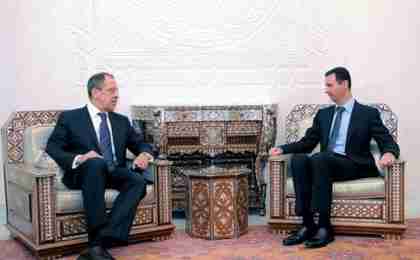 |
The fallout from Russia's and China's veto of the U.N. Security Council resolution on Syria continues, as the regime's escalated warfare on its own unarmed citizens continues. Arab states in the Gulf Cooperation Council (GCC) are recalling their ambassadors from Syria. They include Saudi Arabia, Qatar, United Arab Emirates, Bahrain, Oman, and Kuwait. The US closed its embassy in Syria on Monday, and several European countries have recalled their ambassadors. Russia has been stung by the international backlash against the veto. Mainstream news analysts expressed optimism over the visit by Russia's Foreign Minister Sergei Lavrov, who visited Syria's president Bashar al-Assad on Tuesday. But nothing came of the meeting, as can be seen from Lavrov's statement: "The President of Syria has assured that he is fully committed to the goal of putting an end to the violence." Nothing new. BBC
Prime Minister Recep Tayyip Erdogan said that the veto by China and Russia of a U.N. resolution on Syria a "fiasco" that gave a "green light" to Syria's government to continue military attacks on its own people:
"We are going to start a new initiative with those countries that stand by the people, not the Syrian government. We are preparing this.The process that occurred at the United Nations in relation to Syria is a fiasco for the civilized world.
The UN Security Council has once again held captive the conscience of the international community. Possessing the power to veto is a great responsibility. Using this power gives a green light for the persecution to continue."
Erdogan didn't give any details of the "new initiative." But it's worth noting that Erdogan has hinted at taking action many times in the last year, but has never actually done so. Zaman (Ankara)
The Pentagon and U.S. Central Command have begun a preliminary internal review of U.S. military capabilities in order to prepare options in the event that President Obama calls for military action in Syria. One of the officials called the effort a "scoping exercise" to see what capabilities are available given other U.S. military commitments in the region. Though no decisions have been made, options include everything from humanitarian relief to support for opposition groups, to outright military strikes. Also on Tuesday, U.S. Sen. John McCain said that the United States "should start considering all options, including arming the opposition. The bloodletting has got to stop." CNN
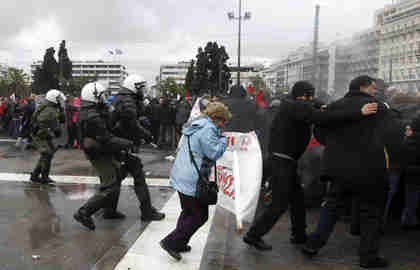 |
Greece's interim minister Lucas Papademos postponed crucial talks with his coalition's party leaders for a second day, raising new questions as to whether a deal can be reached at all. The talks were to have taken place on Monday, then on Tuesday, and are now postponed to Wednesday. One of the stumbling blocks that emerged on Tuesday were the new demands by EU officials for cuts to basic pensions, which start at 360 euros per month. Former prime minister George Papandreou and his aides agreed that further cuts to basic state pensions should be rejected. Kathimerini
Workers in Greece are staging a 24-hour strike to protest new austerity measures, including the layoffs 15,000 civil service employees this year, reduced pension, and a reduced minimum wage. The strikes are firmly backed by the European Trade Union Confederation, which issued this statement:
"The new austerity package being discussed to avoid a default by Greece is unacceptable. Greek workers and citizens have been pushed to the limit. Successive austerity plans have plunged the country ever deeper into crisis.The new measures being considered are simply not defensible: reduction in the minimum wage, cuts in supplementary pensions and immediate job cuts in the public service.
Labor law is being flouted and men and women are being crushed in the process. We warn all those who are putting pressure on Greece or justifying such pressure: workers cannot take any more."
Strikes are expected to grow, along with the austerity measures. Irish Times
Left-wing protests continue to increase in Europe and America, as the financial crisis deepens. A violent protest by "Occupy Wall Street" protesters in Oakland, Calif., last week resulted in over 400 arrests when they tried to seize the long-vacant Henry J. Kaiser Convention Center, entered the Oakland YMCA and broke into Oakland City Hall, where they vandalized the ground floor. Statements posted on the Occupy Oakland website urged those opposed to violence or vandalism to either steer clear or avoid interfering with those willing to engage in mayhem:
"If you identify as peaceful and are likely to interfere with the actions of your fellow protesters in any way (including telling them to stop performing a particular action, grappling, assaulting or holding them for arrest), you may not want to attend this march," one statement read. "It is a militant action. It attracts anti-capitalists, anti-fascists and other comrades of a revolutionary bent. It is not a march intended for people who are not fully comfortable with diversity of tactics."
With the recession continuing to worsen, suicide help lines in Ireland are being swamped with tens of thousands of pleas for help, as the suicide rate increases to over three per day, with men more likely to die by suicide than women, and males aged 15-24 the highest risk category. The situation is so bad that police are watching known suicide spots like the quays in Dublin, Cork, Limerick and Waterford and the sea cliffs in Clare. The suicide rate is expected to increase dramatically throughout Europe and America as the financial crisis deepens and people, especially older people, face homelessness, bankruptcy and soup lines. As a result, some people are calling for legalization of suicide kits and doctor-assisted suicide. Irish Central
(Comments: For reader comments, questions and discussion,
see the 8-Feb-12 World View -- U.S. begins 'scoping exercise' for military action in Syria
thread of the Generational Dynamics forum. Comments may be
posted anonymously.)
(8-Feb-2012)
Permanent Link
Receive daily World View columns by e-mail
Donate to Generational Dynamics via PayPal
U.S. closes embassy in Damascus, Syria
This morning's key headlines from GenerationalDynamics.com.
On some days there's no news, and on other days there's too much news. This is one of the latter days.
 |
Nicolas Sarkozy has not yet even officially announced his intention to run for another term as president of France, but it's already clear that German Chancellor Angela Merkel is going to campaign for him. According to Der Spiegel, "The sober chancellor and the peripatetic president have established a pact, the likes of which has never before been seen in the Franco-German relationship. Merkel has decided to openly campaign for her partner in Paris. For Sarkozy, she is discarding the reserve that chancellors have for decades felt proper when it comes to democratic elections outside German borders. When Sarkozy begins stumping, she will be standing next to him on stage -- at least that is the plan." In fact, this is a plan of desperation, since polls indicate that Sarkozy is far behind his Socialist party challenger, Francois Hollande. Hollande is opposed to many of Merkel's austerity programs, which have been supported by Sarkozy. If Sarkozy is not re-elected, then Merkel's entire European strategy could fail as well. Der Spiegel
Several European leaders, including Nicolas Sarkozy, Angela Merkel, and Jean-Claude Juncker, all sent a strong message to Greece on Monday that after weeks of delay upon delay, they now had only hours to come to an agreement, or face disorderly bankruptcy in March. The message seemed to have an effect, as Greece's three coalition parties claim to have agreed on several billion euros' worth of savings, with final details to be worked out on Tuesday. The announced terms include the following:
EU officials are demanding cuts of €3.3 billion, but these measures only save around €2.5 billion. The remaining €850 million will have to be agreed on Tuesday. Kathimerini
 |
From the State Department on Monday:
"The United States has suspended operations of our Embassy in Damascus as of February 6. Ambassador Ford and all American personnel have now departed the country.The recent surge in violence, including bombings in Damascus on December 23 and January 6, has raised serious concerns that our Embassy is not sufficiently protected from armed attack. We, along with several other diplomatic missions, conveyed our security concerns to the Syrian Government but the regime failed to respond adequately.
Ambassador Ford has left Damascus but he remains the United States Ambassador to Syria and its people. ...
As the Secretary told the Security Council on January 31, we continue to be gravely concerned by the escalation of violence in Syria caused by the regime's blatant defiance of its commitments to the action plan it agreed to with the Arab League. The deteriorating security situation that led to the suspension of our diplomatic operations makes clear once more the dangerous path Assad has chosen and the regime’s inability to fully control Syria. It also underscores the urgent need for the international community to act without delay to support the Arab League’s transition plan before the regime’s escalating violence puts a political solution out of reach and further jeopardizes regional peace and security."
At a press conference on Sunday, Secretary of State Hillary Clinton said, "Faced with a neutered Security Council, we have to redouble our efforts outside of the United Nations with those allies and partners who support the Syrian people's right to have a better future." Dept. of State and CS Monitor
With criticism from the West and the Arab League countries growing, Russia's foreign minister Sergei Lavrov is rushing to Damascus, Syria, to try to convince Syria's president Bashar al-Assad to end the violence. Russia and China have been drawing increased international criticism of their Saturday veto in the U.N. Security Council of the Arab League's proposed resolution on Syria. This is especially the case because their veto seems to have given al-Assad the green light to substantially escalate the violence. According to Arab League Secretary-General Nabil Elaraby:
"There was no need for the veto, We were about to reach a conclusion on the resolution that would have been supported by everyone. The (Syrian) government, definitely, may have interpreted this as the international community unable to do anything and (so) we can do whatever we want."
However, Russian analysts say that Russians were "played for fools" during the Libyan crisis, and are calling the veto a "diplomatic victory," because Russia is reinforcing its diplomatic clout, defending its interests in the region and threatening to put the West in an embarrassing position if it decides to invade without sanction of the Security Council. Reuters and Ria Novosti
A lot of the political and punditry talk these days is that Syria is either in a civil war, or close to being in one. The implication is a repeat of the 1976-82 Syrian civil war that climaxed in the massive genocidal slaughter in 1982 in Hama. But from the point of view of Generational Dynamics, a new civil war is impossible at this time, since Syria is in a generational awakening era, with many remaining survivors of the last civil war still alive. If a new civil war breaks out, then it will fizzle relatively quickly, probably within a few months. The real danger for Syria is not that there'll be a Syrian civil war, but that the violence in Syria will trigger a wider regional war. Neighboring countries, including Turkey, Saudi Arabia, Qatar, Israel, the Palestinian territories, and Egypt are all in a generational crisis era. Sooner or later, something is going to trigger a regional war among these countries, and the Syrian violence might turn out to be that trigger.
 |
With the emir of Qatar, Sheikh Hamad Bin Khalifa al-Thani, acting as mediator, Palestinian Authority (Fatah) president Mahmoud Abbas and Hamas leader Khaled Meshaal signed an agreement on Monday to form a unity government. Hamas and Fatah have been split since the 2007 war that gave Hamas control of Gaza. Egypt has attempted several times to mediate a reconciliation between the two Palestinian groups, but those attempts have always failed. Thus, it will be a major diplomatic coup for Qatar if its mediation efforts succeed. A major dispute that caused previous attempts to fail is that Abbas wanted current Palestinian Prime Minister Salam Fayyad to remain as Prime Minister in the unity government, since he's a U.S.-educated internationally respected former World Bank economist who can reassure the West about a unity government containing Hamas. However, Hamas is bitterly opposed to Fayyad in the government, so in the new agreement, Abbas will be both president and prime minister of the unity government, something that violates the Palestinian Authority's own charter. Speaking during the signing ceremony in Doha, Hamas leader Meshaal said:
"We inform our people that we are serious about healing the wounds ... to reunite our people on the foundation of a political partnership, in order to devote our effort to resisting the [Israeli] occupation."
Israel's prime minister Benjamin Netanyahu has condemned the Palestinian unity government deal as a decisive step away from the U.S.-led peace process. A special statement issued by his office said:
"If President Abbas moves to implement what was signed today in Doha, he will abandon the path of peace and join forces with the enemies of peace.Hamas is an enemy of peace. It's an Iranian backed terror organization committed to Israel's destruction. It has not accepted the minimal conditions set by the international community:
* It refuses to recognize Israel's right to exist.
* It refuses to honor the signed agreements between Israel and the Palestinian Authority.
* It refuses to abandon terrorism. Indeed, it continues to arm itself for even deadlier terrorism.
President Abbas, you can't have it both ways. It's either a pact with Hamas or peace with Israel. It's one or the other. You can't have them both."
Israel, the U.S. and Europe have named Hamas as a terrorist group. The removal of Salam Fayyad from the unity government is a serious red flag to the West. Israel PM's office and Telegraph
(Comments: For reader comments, questions and discussion,
see the 7-Feb-12 World View -- Palestinian Authority / Fatah sign unity agreement with Hamas
thread of the Generational Dynamics forum. Comments may be
posted anonymously.)
(7-Feb-2012)
Permanent Link
Receive daily World View columns by e-mail
Donate to Generational Dynamics via PayPal
Another weekend goes by with no deal on Greece bailout
This morning's key headlines from GenerationalDynamics.com.
 |
Chinese shoppers on their Lunar New Year holiday were less lavish than expected at Hong Kong jewelers, curbed spending on beauty brands and slowed spending at South Korean stores. They may keep that pace in the coming year of the dragon. This comes as China's real estate bubble is collapsing, while exports are down because of financial problems in North America and Europe. Bloomberg
Burhan Ghalioun, head of the opposition umbrella Syrian National Council, called Saturday's veto of the Syria resolution by Russia and China a "a new license to kill from these two capitals for Bashar al-Assad and his criminal regime, which just yesterday killed 300 people." The last reference reflects the fact that the Bashar al-Assad regime in the last couple of days has poured more military firepower into the slaughter of unarmed civilians, apparently supremely confident that they can do anything they want and remain protected by Russia and China. In that sense, Ghalioun is right that al-Bashar now has a new license to kill. U.S. Secretary of State Hillary Clinton called the veto a "travesty," and indicated that the U.S. would join France in organizing a "Friends of Syria" group to take action on their own. Reuters
Republican presidential candidate Newt Gingrich said Sunday that the U.S. could take covert action to help oust Syrian president Bashar al-Assad, without using U.S. troops.
"I think there are a lot of things we could do covertly in terms of supplying weapons, supplying -- helping people in the region supply advisers.I think we should make clear to the world that Assad is going to go. And I think you can put together a coalition to get rid of him. I don't think you need to use American troops, but you do need to communicate that those who are opposed to Assad will get the kind of support they need in order to defeat him."
This appears to me to be a widely felt sentiment outside the United States. AFP
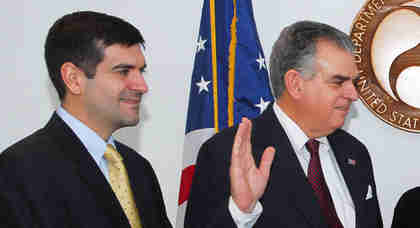 |
Egypt on Sunday referred 19 Americans and 24 other employees of nonprofit groups to trial before a criminal court on accusations they illegally used foreign funds to foment unrest in the country. The Americans included Sam LaHood, the head of the Egypt office of the Washington-based International Republican Institute and the son of U.S. Transportation Secretary Ray LaHood. On Saturday, U.S. Secretary of State Hillary Rodham Clinton warned Egypt that failure to resolve the dispute may lead to the loss of American aid. The Egyptian minister, Mohammed Amr, responded Sunday by saying the government cannot interfere in the work of the judiciary. AP
The meeting of eurozone finance ministers that had been scheduled for Monday but was canceled to give the Greek bailout negotiations more time has been rescheduled to Wednesday. Greece's Finance Minister Evangelos Venizelos said that a deal had to be in place by Sunday evening in preparation for Wednesday's meeting, but no deal was forthcoming on Sunday. Actually, it's worth remembering that this bailout was announced last year on July 21, subject to a few details that would have to be worked out, and those details are still being debated. The really, really, really, really serious deadline is February 13, to allow for all procedures to be completely before Greece's March 20 bond payment is due. Unless somebody caves in, Greece will go bankrupt on that date. Bloomberg
(Comments: For reader comments, questions and discussion,
see the 6-Feb-12 World View -- U.S.-Egypt crisis grows as Americans face criminal trials
thread of the Generational Dynamics forum. Comments may be
posted anonymously.)
(6-Feb-2012)
Permanent Link
Receive daily World View columns by e-mail
Donate to Generational Dynamics via PayPal
The recurring relationship between Generation-X and Boomers
Throughout my lifetime, one historical question I've heard raised over and over again involved the Nazi Holocaust: How was it possible that ordinary Germans participated in the genocide of millions of perfect nice, loyal German citizens, simply because they were Jewish? One might attribute the attitude of Adolf Hitler himself to some kind of psychosis, but how is it conceivable that ordinary Germans apparently had no "moral compass," and willingly proceeded in this genocide? More broadly, why is it that Jews in particular have been persecuted in many countries throughout history? Generational Dynamics theory provides a proposed explanation for all of these questions.
 |
From the point of view of generational theory, there is a catastrophe in progress in the current time that is equivalent to the Holocaust: The financial crisis, caused by "financial engineers" in banks and other institutions around the world that purposely created highly complex but fraudulent synthetic securities, and then paid off peers at ratings agencies to give them AAA ratings. How could so many ordinary professionals, including lawyers, accountants and regulators, consistently abandon their professional ethics to create such a massive fraud that's destroyed so many lives, with the worst yet to come?
The Holocaust is a uniquely violent event in human history, and no Gen-Xers have killed Boomers in the financial crisis. But the two events share the same kind of underlying generational behavior, differing only in degree.
Since the 1990s, many researchers have reported the hatred that Generation-Xers have for Boomers. Gen-Xer Barack Obama expressed this hatred in his book:
"In the back and forth between Clinton and Gingrich, and in the elections of 2000 and 2004, I sometimes felt as if I were watching the psychodrama of the baby boom generation — a tale rooted in old grudges and revenge plots hatched on a handful of college campuses long ago — played out on the national stage."
His Gen-X adviser, Paul Begala, was more direct: "I hate the Baby Boomers. They're the most self-centered, self-seeking, self-interested, self-absorbed, self-indulgent, self-aggrandizing generation in American history."
This hatred came about because of the environment in which Gen-Xers were raised. Because of feminist and government policies that paid mothers to dump fathers, most Generation-X children were raised without the essential influence and protection of their biological fathers. These children don't read feminist press releases, so they could see for themselves that their mothers lied to courts and welfare officials to drive the fathers away. Instead, they were raised by depressed single mothers, and had no male influences except a steady stream of men in their mothers' beds, some of whom physically or sexually abused them. These children, not surprisingly, grew up hating their parents' generation.
Feminist policies particularly targeted black children, destroying black families so thoroughly that 72% of Gen-X black children were born out of wedlock. Young black children, looking for a role model, might have selected a black public figure born into the worst of circumstances, who worked hard in job after job, and fought his way to the top, to become a nominee as a Supreme Court Justice, only to have the same feminist groups who destroyed their families now use incredibly trivial and nonsensical charges to destroy the career of Clarence Thomas, only because he was powerful black man married to a white woman. And it was not lost on these children that far more serious charges of violent serial rape that were brought against another public figure, Bill Clinton, were ignored by feminists because he was a white man. This went well beyond politics. No Republican or Democrat has ever been subjected to vengeful feminist hate-filled racist fury like Clarence Thomas was, whose unique attribute is that he's a well-known public figure who is black, married to a white woman. And since these black Gen-X children didn't read the fatuous nonsense in feminist press releases, they knew very well that the hatred directed at Clarence Thomas was based entirely on racist feminist policies. And these racist, bigoted attacks by feminists and Democrats on Clarence Thomas are continuing to this day.
The Gen-X hatred of Boomers ameliorated during the late 1990s, when many Gen-Xers made fortunes during the high tech boom. But it turned to a generational vengeful fury when they lost their fortunes in the Nasdaq crash that occurred in 2000.
This vengeful fury is the attitude that prevailed as Gen-Xers reached middle management positions in financial institutions in the early 2000s. They had poured out of Masters programs in financial engineering in the 1990s, and they saw how they could use these new tools to get revenge on the hated Boomers -- by creating these fraudulent synthetic securities and selling them to the Boomer investors. Their own Boomer bosses did not stand in the way. Boomers often make poor bosses because they grew up in the 1960s developing no management skills except to protest and complain. As a result, Boomers aren't good managers, and they're very gullible, so that dishonest Gen-Xers can easily take advantage of them.
If you have doubts that the attitudes of Gen-Xers are different from the attitudes of Boomers, there is one clear, measurable difference. This is a huge, major, enormous, gigantic, overwhelming difference between the Gen-X culture and the Boomer culture, and this is the difference that makes the Gen-X culture so toxic.
When the Savings and Loan crisis occurred in the 1980s, the Boomer prosecutors investigated every detail, made thousands of criminal referrals and had numerous convictions. The 2000s financial crisis is much worse, and yet there has not been even one criminal referral or conviction. The Justice Department refuses to investigate and prosecute the crimes that were committed.
This is the huge difference with the Gen-X culture: Boomers had no problem prosecuting other Boomers, but Gen-Xers adamantly refuse to investigate and blame each other, even for serious crimes. Thus, even if there are only a few dishonest Gen-Xers, they can do an enormous amount of damage because they can commit crimes at will and count on not being punished by Gen-X prosecutors. This has huge consequences, as Gen-X financial engineers could and can commit serious crimes freely.
It's even worse than that, because Gen-X regulators and prosecutors have actually encouraged continued fraud. In 2008, I wrote frequently about Gen-X New York Insurance Superintendent Eric Dinallo who not only did not prosecute the banksters at Citibank and others, but actually arranged for them to continue defrauding the public and investors. And a recent 60 Minutes investigation shows that the Obama Justice Department adamantly refuses to investigate and prosecute this bankster fraud, even in the face of massive evidence of fraud.
That's exactly the kind of culture that prevailed in 1930s Nazi Germany. It was possible to rob, defraud, assault or even kill a Jew for revenge, and these actions were not only not investigated and prosecuted by German officials, they were actually encouraged and supported by officials, all the way up to Hitler himself. This is EXACTLY the same kind of generational behavior we've been seeing today, differing only in degree.
The relationship between Gen-Xers and Boomers is hardly unique in history. The generation that grew up after the Civil War was called the "Missionary Generation," and you can just imagine from their name how similar they were to the Boomers that grew up after WW II. The Missionary Generation created societal chaos that the next generation, known as the "Lost Generation," came to hate them for. It's the Lost Generation that's the archetypal ancestor of Generation-X. America's Lost Generation hated the Missionary Generation even before World War I, but that hatred became palpable after the war, which they blamed entirely on the Missionaries.
World War I was a political disaster for Germany. From the point of view of Generational Dynamics, World War I for Germany was not at all like World War II, but was generationally equivalent to the 1960s Vietnam War for America. Germany fought the war half-heartedly. There was a vigorous anti-war movement that turned the public against the war, and finally Germany was forced to capitulate -- not because they were defeated on the battlefield, but because they were defeated politically at home by their anti-war movement. The Treaty of Versailles that followed the war was highly punitive to Germany, and Germany was completely humiliated.
Germany's Lost Generation blamed the war, the subsequent hyperinflation, and even the 1929 stock market crash on the Missionary Generation, especially the Jews who were associated with that generation. Robbing, defrauding, assaulting or even killing a Jew was no problem, because it was revenge for the war and the financial collapses. To them it wasn't genocide; it was justice. Gen-Xers also feel it's just justice today, when they defraud Boomers.
This resolves the puzzle of why ordinary Germans participated in the 1930s Holocaust, but there's a larger question as well: Why has there been repeated persecution of Jews at many times and places for many centuries. Is there something unique about Jews that attracts this kind of persecution?
Generational hatred is the worst kind of hatred because it spreads rapidly with no natural barriers. It's so powerful that it overwhelms reason and common sense. If your generation hates some group, then all your friends will feel the same way and will reinforce your hatred. Anyone who objects can be ignored as being either too young and naive or too old and senile.
A generational fault line can easily morph into a political fault line, as people in all generations pick sides in the generational dispute, and then the generational hatred becomes politicized. In America, for example, the Gen-Xer culture has been aligned with the Democrats, and we've seen xenophobic attitudes towards the Tea Party from the Democrats, and xenophobic attitudes towards Muslims from the Republicans.
The generational split between Boomers and Gen-Xers is not unique in history. We've described the same generational split between Germany's Missionary Generation and the Lost Generation that led to the Holocaust.
In generational theory, the Missionary and Boomer generations are in the "Prophet Archetype," while the Lost and Gen-X generations are in the "Nomad Archetype." These archetypes repeat in every place and time in history.
All Prophet generations have the same characteristics as Boomers -- highly moralistic, arrogant and narcissistic -- not always right, but always certain. All Nomad generations have the same characteristics as Generation-X, disaffected and angry at society and the preceding Prophet generation.
Jewish communities have characteristics that are consistent with the Prophet generations, with a culture that's often isolated and highly moralistic, based on ancient laws. This means that when a generational fault line morphs into a political fault line, the Jewish community is almost certainly going to be aligned with the Prophet generation, and hated by the younger Nomad generation. The situation is amplified by the fact that Jewish law provides for very careful handling of money and debt, meaning that the people in the Jewish community do well during financial crisis periods, while other communities struggle.
This is the generational explanation for the xenophobia towards and persecution of Jews throughout history. The same kind of analysis can provide explanations for other persecuted groups, and for other genocides in history.
Right now, we see Europe's economy disintegrating right before our eyes, with no hope in sight. How will the generational split manifest itself when total meltdown occurs? Another Holocaust for Jews? Mass killing of Muslims and/or Roma Gypsies? Or simple ethnic violence (Greeks versus Germans), spiraling into total war? We won't have to wait too much longer to find out.
This article is excerpted from the forthcoming book by John J. Xenakis, "For Boomers: How to Survive in a Generation-X World: Making your way in the workplace, in love and in life."
(Comments: For reader comments, questions and discussion, see the Generation-X culture vs Boomer culture thread of the Generational Dynamics forum.)
(5-Feb-2012)
Permanent Link
Receive daily World View columns by e-mail
Donate to Generational Dynamics via PayPal
U.S. accepts all of Taliban's six pre-conditions for talks
This morning's key headlines from GenerationalDynamics.com.
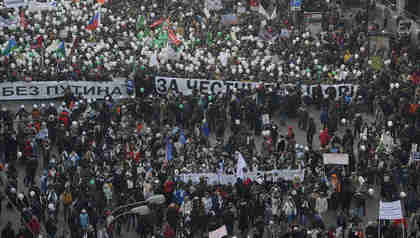 |
It's now widely believed by observers that December's elections for the lower house of Russia's parliament were highly fraudulent, and even so provided just a bare victory for Vladimir Putin's party. The result has been something new -- rising anti-Putin protests. Tens of thousands of protesters took part in an anti-Putin march on Saturday, yelling "Russia without Putin!" and "Putin is a thief!" At the other end of Moscow was another large rally, this one in favor of Putin, urging an end to "the Orange Revolution" a reference to the uprisings that saw regime change in the former Soviet republics of Ukraine and Georgia almost a decade ago. One Putin supporter said, "We say no to the destruction of Russia! Let’s take out the Orange trash!" Ria Nostovi
Anxious for a peace deal that allows the withdrawal of American troops, the U.S. has agreed to six Taliban pre-conditions for the talks: The conditions are: (1) The talks would not be held in any neighboring country of Afghanistan; (2) the talks will not be held in any country allied with Nato; (3) the talks will be held in the country that has not been hostile to Taliban during the last 10 years; (4) no ceasefire will be demanded before, during or after the talks; (5) Taliban will not accept any condition contrary to Sharia; (6) whenever desired, the Taliban will disassociate from the talks. Qatar was chosen for the talks because it met that Taliban's pre-conditions. Taliban sources say that the agenda of their talks with the US comprised three points: (1) Five important Taliban held at Guantanamo may be released and a swap may be held between the prisoners of allies and Taliban. (2) There shall be no ceasefire, and (3) All allied forces shall leave Afghanistan. The News (Pakistan)
 |
The past 24 hours have been one of the bloodiest of Syria's war, with government forces launching massive artillery barrages on unarmed civilians and their homes, killing hundreds in one day. That was the backdrop against which thirteen of the fifteen members of the U.N. Security Council voted in favor of the Arab League sponsored resolution calling for Syria's president Bashar al-Assad to resign. However, the resolution failed because of vetoes by Russia and China. CS Monitor
U.N. Security Council members used strong language following Russia's and China's veto of the U.N. Security Council resolution of the Arab League sponsored resolution on Syria:
The regime of Bashar al-Assad almost appeared to be mocking the Security Council deliberations by substantially escalating the bloody slaughter of unarmed civilians, apparently full of confidence that no body count was so great that it would prevent Russia and China from vetoing the resolution. Ironically, Russia's veto of the weakened resolution may backfire, since it violates the "Kick the Can Theory" that I proposed last year, that says that all decisions should kick the can down the road. The resolution has been so weakened during negotiations that it meant nothing, and Russia could have kicked the can down the road by abstaining. Now that it's been vetoed, it's far more likely that the West will join the Arab League in taking some kind of unilateral action. France's President Nicolas Sarkozy said on Saturday after the U.N. vote:
"France is not giving up. It is consulting with its Arab and European partners to create a 'Friends of the Syrian People Group' with the goal of giving international support to implement the Arab League transition plan."
The nature of the Arab League "transition plan" remains to be seen, but it seems certain that it will go farther than the weakened resolution would have allowed. Reuters
Western economic sanctions on Syria and Iran are causing sharp currency devaluations for Iran's rials and Syria's pounds. Dollars are still heavily used in Iraq, and Iraq's money changing shops are emerging as an important source of dollars for both Syria and Iran, as importers and travelers become desperate to obtain hard currency. However, some money changers are refusing to accept rials or pounds, for fear of being saddled with large amounts of the currencies just before fresh devaluations. Reuters
(Comments: For reader comments, questions and discussion,
see the 5-Feb-12 World View -- Bitter recriminations follow Russia/China veto of Syria resolution
thread of the Generational Dynamics forum. Comments may be
posted anonymously.)
(5-Feb-2012)
Permanent Link
Receive daily World View columns by e-mail
Donate to Generational Dynamics via PayPal
Monday euro meeting cancelled as Greece bailout talks fail
This morning's key headlines from GenerationalDynamics.com.
 |
Thursday's statement by Defense Secretary Leon Panetta that he believes there is a strong likelihood that Israel will strike Iran in April, May or June has drawn a sharp reaction from Supreme Leader Ayatollah Ali Khamenei:
"You see every now and then in this way they say that all options are on the table. That means even the option of war. This is how they make these threats against us."Well, these kinds of threats are detrimental to the U.S. The war itself will be 10 times as detrimental to the U.S.
The Zionist regime is really the cancerous tumor of this region and it needs to be removed and will be removed."
There have been several cycles of escalating rhetoric between Iran on the one hand and Israel and the U.S. on the other. Whether this leads to war remains to be seen. CNN
More than 200 people were reported kills in Homs, Syria, on Thursday, as the United Nations Security Council, tries to reach agreement on a resolution condemning the violence in Syria. Russia, which sells arms to Syria and has a naval base in Syria, has indicated that it will veto any proposed resolution that actually says anything. Guardian
According to Debka's subscriber-only newsletter (sent to me by a subscriber), the U.S., Britain, France, Turkey, Saudi Arabia, Jordan and Qatar are currently in the midst of a clandestine operation to topple president Bashar al-Assad of Syria. Their intelligence agencies are pitching different groups of generals in Syria's army, many of whom are reached through their ethnic, tribal, religious, clan or class affiliations.
" The pitch is simple: It is past time to stop the cruel butchery devastating Syria before the country slides into civil war or breaks up into warring cantons. The only way to halt the bloodbath is for the army to march on Damascus, evict the Assad family regime and install a military government to hold the reins for the transition to civilian rule and national elections They are reached through diverse channels: Targeted officers are surprised by calls to their unlisted private phone numbers or their command centers through military communications networks. Some are reached by email; others find undercover couriers turning up on their doorsteps at home."
The objective is to spearhead a military coup.
"This stratagem is seen by our military and intelligence sources as more analogous to the American covert tactic for toppling Saddam Hussein in 2003 than the anti-Qaddafi operation five months ago. The CIA prepared the way for the US invasion of Iraq by subverting the Iraqi generals and colonels responsible for the defense of Baghdad to make sure they abstained from resisting the invasion. American agents worked through those officers' expatriate relatives living in the US and Iraqi officers recruited before the war."
According to the report, both Syria and Iran are fully aware of this plan, and are preparing for military action. Debka
Soooooo, let's keep score: A covert attack on Syria, a possible Israeli attack on Iran, utter chaos in Egypt and Yemen. What does that add up to?
I've been getting a headache listening to various European officials these last two weeks saying that a final deal on the next Greek bailout was "nearly complete" or "one step away" or "a couple of days away" or "almost in hand." These same statements were repeated day after day, and now over two weeks have slipped by, and there's no deal. A major stumbling block is the recent realization that the old €130 billion bailout amount is too little, and at least €15 billion more are needed. The Netherlands and Germany don't want to pay any more, the investors don't want to lose any more, and the European Central Bank (ECB) still doesn't want to lose anything. Meanwhile, Greece's unions don't want any layoffs or salary reductions or even a reduction in the minimum wage. So all these negotiators have apparently been in a room this past two weeks arguing about the same things over and over. The meetings are continuing into the weekend, but the EU has scrapped a planned Monday meeting of the eurozone finance ministers, to give the negotiators "a few more days" to come up with a deal. Irish Times
(Comments: For reader comments, questions and discussion,
see the 4-Feb-12 World View -- Threats of war in Iran and Syria
thread of the Generational Dynamics forum. Comments may be
posted anonymously.)
(4-Feb-2012)
Permanent Link
Receive daily World View columns by e-mail
Donate to Generational Dynamics via PayPal
Suspicions grow of planned massacre at soccer game in Egypt
This morning's key headlines from GenerationalDynamics.com.
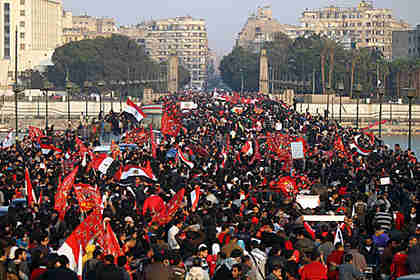 |
Some people thought that Egypt was finally beginning to calm down, a year after the start of the Egyptian Revolution, but the deaths of 74 young people on Wednesday at a football (soccer) match in Port Said, with over 1,000 injured, has enraged tens of thousands of Egyptians, especially in Cairo. There were plenty of riot police present at the game, but video shows that they allowed the violence to continue without interference, and they may even have aided the violence by blocking the escape route of the victims. The victims were fans of the visiting team, Cairo's Al-Ahly football club, a group that had actively taken part in the Tahrir Square protests during the past year, and the suspicion is widespread that police were responsible for the violence, in order to get revenge against the Al-Ahly team. On Thursday, thousands of protesters marched from the Al-Ahly club in Cairo to the headquarters of the ministry of interior, chanting "This was not a sports accident, this was a military massacre." Black-clad riot police fired tear gas at them, resulting in hundreds of new injuries. Much larger protests are expected on Friday, when people come pouring out of mosques after midday prayers. The National (UAE)
Wednesday's surprise announcement by Defense Secretary Leon Panetta that U.S. forces would end combat operations a year earlier, in 2013 instead of 2014, has caused some confusion. In Kabul, a senior Afghan security official said his government had not been informed of Panetta's announcement and said it "throws out the whole transition plan." He said, "Transition has been planned against a timetable and this makes us rush all our preparations. If the Americans withdraw from combat, it will certainly have an effect on our readiness and training, and on equipping the police force." Reuters
Defense Secretary Leon Panetta said on Thursday that he believes there is a strong likelihood that Israel will strike Iran in April, May or June. Israel believes that that's the time frame just before Iran enters a "zone of immunity," when it will no longer be possible militarily to prevent Iran from developing a nuclear weapon, because there will be enough enriched uranium stored in deep underground facilities. Panetta's statement was startling and exceptionally specific, giving rise to speculation about a hidden message that Israel is on its own with an attack on Iran. Washington Post
(Comments: For reader comments, questions and discussion,
see the 3-Feb-12 World View -- Panetta says Israel may strike Iran in April, May or June
thread of the Generational Dynamics forum. Comments may be
posted anonymously.)
(3-Feb-2012)
Permanent Link
Receive daily World View columns by e-mail
Donate to Generational Dynamics via PayPal
Germany to China: Bail us out for your own good
This morning's key headlines from GenerationalDynamics.com.
 |
Royal Air Force helicopter pilot Prince William, the Duke of Cambridge, is on his way to the Falkland Islands (known as the Malvinas islands in Argentina) for a six-week military mission. This comes at a time of increasing tensions between Britain and Argentina ahead of the 30th anniversary of Britain's victory over Argentina in the 1982 Falklands war. According to Argentina's foreign ministry, Argentines are saddened that Prince William "will arrive on our soil in the uniform of a conquistador, and not with the wisdom of a statesman who works for peace and dialogue between nations." Telegraph
In one of the country's worst disasters since last January's Egyptian Revolution, 74 people were killed in deadly clashes following a football (soccer) match between two of Egypt's football teams that have been known to provoke violence in the past. At least 1,000 people were also injured. Video of the event shows the clear presence of large numbers of riot police at the stadium, but they refused to intervene when the violence broke out, and they drifted away as the violence worsened. The Muslim Brotherhood blames the violence on supporters of deposed dictator Hosni Mubarak, and lauched a scathing attack on the interior ministry.
"The security vacuum continues, the police officers are punishing us for revolting. This is another episode of the kind of violence which happened in Maspero, Mohamed Mahmoud and in front of the cabinet during the past few months.In all those incidents, the authorities failed to hold anyone accountable."
The Maspero violence refers to violence last October by the army attacking Coptic Christian protesters, resulting in 25 deaths and hundreds of injuries. The Mohamed Mahmoud violence refers to a clash last November between riot police and unarmed protesters on a street near Tahrir Square in Cairo. Al-Ahram and Al-Jazeera
 |
On Wednesday, an Afghan soldier shot and killed a Nato soldier in southern Afghanistan. The U.S. Defense Department says of the more than 40 attacks by Afghan security personnel on American troops since 2007, 75 percent have taken place in just the past two years. The growing number of attacks by Afghan troops on U.S. and Nato forces is raising questions about Afghanistan's ability to take responsibility for its security. VOA
According to a leaked secret Nato report obtained by the BBC, the Taliban in Afghanistan are being directly assisted by Pakistan's Inter-Services Intelligence (ISI) agency The report says that, in the opinion of the U.S. military, the Taliban, backed by Pakistan, are set to retake control of Afghanistan after NATO forces withdraw. According to the BBC analyst, the insurgents are well-funded and far from surrender, guaranteeing Pakistani influence if Afghanistan's government collapses. The report was based on material from 27,000 interrogations of more than 4,000 captured Taliban and Al-Qaeda operatives. Both Nato and Pakistan are downplaying the report. BBC and Daily Times (Pakistan)
In a surprise announcement on Wednesday, Defense Secretary Leon E. Panetta said that Nato will end its combat mission in Afghanistan in 2013, and shift to a role of providing support and training to Afghan security forces. Some reports indicate that was supposed to be announced by the administration in May, but either Panetta let it slip, or a decision was made to speed it up. Washington Post
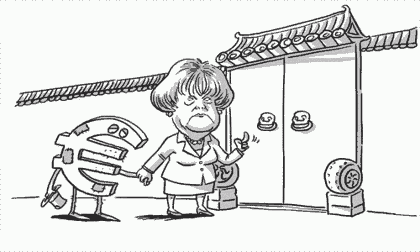 |
German Chancellor Angela Merkel is making her fifth trip to China to encourage China's investment in Europe. "Chinese investments are expressly welcome. They will be sought, used and appreciated" -- both in Germany and in the rest of the euro zone, said a German spokesman. So far, Beijing has been very cautious about such investments, and has refused to invest in Europe's bailout fund. At the same time, Merkel's trip may be overshadowed by the recent unrest in Tibet, and the violent reaction of China's security forces. Der Spiegel
(Comments: For reader comments, questions and discussion,
see the 2-Feb-12 World View -- Leaked Nato report says Pakistan is 'directly assisting' the Taliban
thread of the Generational Dynamics forum. Comments may be
posted anonymously.)
(2-Feb-2012)
Permanent Link
Receive daily World View columns by e-mail
Donate to Generational Dynamics via PayPal
President Obama admits to drone strikes in Pakistan
This morning's key headlines from GenerationalDynamics.com.
 |
They're still debating the "private investor involvement" (PTI+) plan in Greece over how big a loss private investors will have to take "voluntarily" when Greece defaults. According to Finance Minister Evangelos Venizelos on Tuesday, a final deal is only just a "formal step away," and private investors will lose more than 70% of their original investments. "We are talking about a greater PSI than originally foreseen in July. We are talking about a 50 percent cut on the nominal value, and a loss on the net present value (NPV) of more than 70 percent." Venizelos says that no decision had yet been made on whether the European Central Bank will take any losses on its €50 billion in Greek bonds. Whatever deal is made, it must be completed by February 13, according to Venizelos. Kathimerini
At every stage of the financial crisis that began in 2007, governments around the world have responded with huge new increases in public debt. Remember the debate of President Bush's $60 billion stimulus bill? Now, with Europe on the ropes from the financial crisis, the Europeans are considering a huge new debt bubble -- a €1.5 trillion bailout fund ($1.969 billion) that could be used to bail out various countries as they approach default. The money will be contributed from three sources: €500 billion from the European Financial Stability Facility (EFSF), which is a temporary backstop; €500 billion from the European Stability Mechanism (ESM), which is the shiny new backstop scheduled to be in place later this year; and €500 billion from the International Monetary Fund (IMF). However, the U.S. would not participate. Der Spiegel
A continuing war between Pakistan's military and the Pakistan Taliban has surged in the past few days in the mountainous regions of the Kurram tribal area, the tribal region that's closest to Kabul in Afghanistan. A battle started a week ago when government troops seized a crucial mountaintop, killing six soldiers and 20 insurgents, according to a government spokesman. The militants counterattacked on Tuesday, resulting in the deaths of 10 troops and 30 insurgents. The military launched an offensive in Kurram in July 2011 and declared victory about a month later, but violence has continued. The military has launched a series of operations against the Pakistani Taliban in the past few years, and has often declared victory only to see fighting flare up again. AP
On Monday, President Barack Obama said publicly, for the first time, that U.S. drone aircraft have struck Taliban and al-Qaeda targets in Pakistan's Federally Administered Tribal Areas (FATA):
"a lot of these strikes have been in the FATA, and going after al Qaeda suspects who are up in very tough terrain on the border between Afghanistan and Pakistan. For us to be able to get them in another way would involve probably a lot more intrusive military actions than the one we're already engaging in. This is a targeted, focused effort at people who are on a list of active terrorists who are trying to go in and harm Americans, hit American facilities and bases, and so on.[The drones have] not caused a huge number of civilian casualties, [and it's] important for everybody to understand that this thing is kept on a very tight leash."
Pakistan's foreign ministry spokesman Abdul Basit made a brief statement in response:
"We are of the firm view that these are unlawful, counterproductive and hence unacceptable. Our view has always been very clear and position principled."
The use of drone strikes by America, as well as Pakistan's tacit cooperation with the use of drones, have been open secrets since the program was begin in 2004. AFP and Geo TV (Pakistan)
 |
Morocco, the only current Arab member of the U.N. Security Council, presented the Arab League resolution to end the "killing machine" of the Bashar al-Assad regime in Syria. Assad's ally Russia has said repeatedly that they will veto such a resolution when it is presented. The Russians sell weapons to Syria and have their only Mideast naval base in Tartus in Syria, and they will not risk losing these things. Russians have been calling the resolution a path to civil war. In an interview on Australian television on Monday, Russia's foreign minister Sergei Lavrov repeatedly referred to last year's Security Council resolution that permitted a no-fly zone over Libya. Russia abstained on that resolution, and considers the result to have something of a disaster. Here are excerpts from the interview:
SERGEI LAVROV: Russia would not support anything which would be actually imposed on Syrians. ...The international community unfortunately did take sides in Libya and we would never allow the Security Council to authorise anything similar to what happened in Libya. Yes, we condemn strongly the use of force by government forces against civilians, but we can condemn in the same strong way the activities of the armed extremist groups who attack government positions, who attack administration in various provinces of Syria. ...
It's impossible to ... when you say that government forces must leave towns, but at the same time you watch BBC, you watch CNN and you see that parts of those towns are taken by the armed opposition, are you realistically expecting that any government in this situation would leave the city and leave it to the armed groups? I don't think so. ...
Lavrov compares the Arab League to the African Union:
We would not pre-judge the outcome, whether this would involve the president of Syria living, or whether there would be some other solution, we went through this in Libya when the African Union - the organisation of 50-some countries, to which Libya belongs - introduced a plan under which the fate of Gaddafi would've been decided at the end of the negotiating process as part of the overall package.It was rejected because some countries outside the African Union said no, no, no, Gaddafi must go before anything else happens, and then we had what we did. The African Union was humiliated, because to throw away an initiative which was aimed at peacefully resolving the crisis just because somebody had some very personal animosities was a mistake, and if we're going to repeat this in Syria, well, we cannot help it if some people insist on doing something bad. ...
EMMA ALBERICI: I guess the UN wants to apply more pressure. Perhaps an arms embargo.
SERGEI LAVROV: The arms embargo? You know that the arms embargo was introduced on Libya, you know? And after that, people were bragging that arms were supplied openly. The French Minister of Defence said that yes we were sending arms to the rebels.
You know the hypocrisy is not something which the Security Council should be engaged in. ...
Lavrov was asked about arms sales to Syria:
EMMA ALBERICI: Is Russia still selling arms to the Syrian regime?SERGEI LAVROV: Yes, of course. We sell in some contracts and it must be implemented like treaties. The deliveries were done this year.
EMMA ALBERICI: You're arming one side of the fight?
SERGEI LAVROV: No, we are arming the constitutional government, which we don't approve of what it is doing, using force against demonstrators, but the arms ...
EMMA ALBERICI: But you are picking sides?
SERGEI LAVROV: No, no, no, we're not picking sides. We are implementing our commercial contractual obligations. The arms we are selling to Syria, they are not used against demonstrators. Those are arms to protect Syria and to ensure Syrian defence. ...
SERGEI LAVROV: I know that Britain and the United States and others ship arms in the Middle East, 10 or maybe 100 times more than the Russian does
EMMA ALBERICI: You say they're hypocrites?
SERGEI LAVROV: I said hypocrisy is not something the Security Council should be engaged in. Look, you said 18 minutes, right? ...
Lavrov warns that the resolution could lead to a regional war:
SERGEI LAVROV: I'm concerned about another thing. I am concerned at what is going on in Syria, what is going on in the region. Some people take in the context of isolating Iran. And if this happens, I mean if this logic prevails, then unfortunately, we will be witnessing a much bigger drama.What is going on is an attempt to change the balance in the Muslim world. And the rift between Sunni and Shia is absolutely evident. And it is of direct relevance to what is going on in Syria, to what is going on around Iran, to what is going on in Iraq.
Don't forget about the Kurds, the Kurds in Syria, Kurds in Iraq, Kurds in Turkey.
The people who are obsessed with removing regimes in the region, they should be really thinking about the broader picture. And I'm afraid that if this vigour to change regimes persists, we are going to witness a very bad situation much, much, much broader than just Syria, Libya, Egypt or any other single country.
The unending and worsening violence in Syria is extremely embarrassing to Russia. Some analysts suggest that Russia might abstain on the resolution, in order to register its opposition, while allowing it to pass. However, abstaining from the vote on the draft resolution might be seen as tacitly supporting not only military intervention in Syria -- which recently bought around $550m in Russian arms -- but also Assad's removal. Then they might lose their base at Tartus. Al-Jazeera and Australian Broadcasting - Lateline
(Comments: For reader comments, questions and discussion,
see the 1-Feb-12 World View -- Europe considers a huge new 1.5 trillion euro debt bubble
thread of the Generational Dynamics forum. Comments may be
posted anonymously.)
(1-Feb-2012)
Permanent Link
Receive daily World View columns by e-mail
Donate to Generational Dynamics via PayPal
Web Log Summary - 2016
Web Log Summary - 2015
Web Log Summary - 2014
Web Log Summary - 2013
Web Log Summary - 2012
Web Log Summary - 2011
Web Log Summary - 2010
Web Log Summary - 2009
Web Log Summary - 2008
Web Log Summary - 2007
Web Log Summary - 2006
Web Log Summary - 2005
Web Log Summary - 2004
Web Log - December, 2016
Web Log - November, 2016
Web Log - October, 2016
Web Log - September, 2016
Web Log - August, 2016
Web Log - July, 2016
Web Log - June, 2016
Web Log - May, 2016
Web Log - April, 2016
Web Log - March, 2016
Web Log - February, 2016
Web Log - January, 2016
Web Log - December, 2015
Web Log - November, 2015
Web Log - October, 2015
Web Log - September, 2015
Web Log - August, 2015
Web Log - July, 2015
Web Log - June, 2015
Web Log - May, 2015
Web Log - April, 2015
Web Log - March, 2015
Web Log - February, 2015
Web Log - January, 2015
Web Log - December, 2014
Web Log - November, 2014
Web Log - October, 2014
Web Log - September, 2014
Web Log - August, 2014
Web Log - July, 2014
Web Log - June, 2014
Web Log - May, 2014
Web Log - April, 2014
Web Log - March, 2014
Web Log - February, 2014
Web Log - January, 2014
Web Log - December, 2013
Web Log - November, 2013
Web Log - October, 2013
Web Log - September, 2013
Web Log - August, 2013
Web Log - July, 2013
Web Log - June, 2013
Web Log - May, 2013
Web Log - April, 2013
Web Log - March, 2013
Web Log - February, 2013
Web Log - January, 2013
Web Log - December, 2012
Web Log - November, 2012
Web Log - October, 2012
Web Log - September, 2012
Web Log - August, 2012
Web Log - July, 2012
Web Log - June, 2012
Web Log - May, 2012
Web Log - April, 2012
Web Log - March, 2012
Web Log - February, 2012
Web Log - January, 2012
Web Log - December, 2011
Web Log - November, 2011
Web Log - October, 2011
Web Log - September, 2011
Web Log - August, 2011
Web Log - July, 2011
Web Log - June, 2011
Web Log - May, 2011
Web Log - April, 2011
Web Log - March, 2011
Web Log - February, 2011
Web Log - January, 2011
Web Log - December, 2010
Web Log - November, 2010
Web Log - October, 2010
Web Log - September, 2010
Web Log - August, 2010
Web Log - July, 2010
Web Log - June, 2010
Web Log - May, 2010
Web Log - April, 2010
Web Log - March, 2010
Web Log - February, 2010
Web Log - January, 2010
Web Log - December, 2009
Web Log - November, 2009
Web Log - October, 2009
Web Log - September, 2009
Web Log - August, 2009
Web Log - July, 2009
Web Log - June, 2009
Web Log - May, 2009
Web Log - April, 2009
Web Log - March, 2009
Web Log - February, 2009
Web Log - January, 2009
Web Log - December, 2008
Web Log - November, 2008
Web Log - October, 2008
Web Log - September, 2008
Web Log - August, 2008
Web Log - July, 2008
Web Log - June, 2008
Web Log - May, 2008
Web Log - April, 2008
Web Log - March, 2008
Web Log - February, 2008
Web Log - January, 2008
Web Log - December, 2007
Web Log - November, 2007
Web Log - October, 2007
Web Log - September, 2007
Web Log - August, 2007
Web Log - July, 2007
Web Log - June, 2007
Web Log - May, 2007
Web Log - April, 2007
Web Log - March, 2007
Web Log - February, 2007
Web Log - January, 2007
Web Log - December, 2006
Web Log - November, 2006
Web Log - October, 2006
Web Log - September, 2006
Web Log - August, 2006
Web Log - July, 2006
Web Log - June, 2006
Web Log - May, 2006
Web Log - April, 2006
Web Log - March, 2006
Web Log - February, 2006
Web Log - January, 2006
Web Log - December, 2005
Web Log - November, 2005
Web Log - October, 2005
Web Log - September, 2005
Web Log - August, 2005
Web Log - July, 2005
Web Log - June, 2005
Web Log - May, 2005
Web Log - April, 2005
Web Log - March, 2005
Web Log - February, 2005
Web Log - January, 2005
Web Log - December, 2004
Web Log - November, 2004
Web Log - October, 2004
Web Log - September, 2004
Web Log - August, 2004
Web Log - July, 2004
Web Log - June, 2004